Posted: September 15th, 2022 | Author: ucdcoc | Filed under: Disorientation Guide '22-'23 | Comments Off on Alternate Principles of Community
⟵ Back to Table of Contents
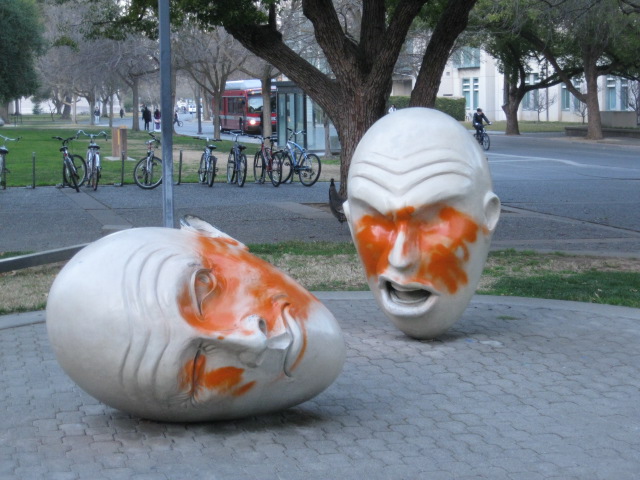
By the end of orientation week, you will certainly have heard multiple references to UC Davis’s Principles of Community. These principles list the values that UC Davis professes to uphold.
UCD Principles of Community
- Affirm the dignity inherent in all of us
- Endeavor to foster mutual understanding and respect
- Affirm the right of freedom of expression
- Promote … our individuality and our diversity within the bounds of courtesy, sensitivity, and respect
- Confront and reject all manifestations of discrimination
- Take pride in our achievements, celebrate our differences
Take a look around. Does it look like UC Davis actually cares about these things? Based on the actions of administrators and the institution as a whole, we clearly know better.
Here is an updated list of principles that accurately reflect the institutional priorities and values of UC Davis, the Alternate Principles of Community:
Alternate Principles of Community
- “Civility” means “shut up”
- Police toys matter more than good, well-compensated instructors
- Disabled students and universal accessibility are a low priority
- No student is inherently deserving of food or housing
- The exorbitant amount of money that is extracted from you for “tuition and fees” will go towards paying Chancellor Gary May’s annual salary of $587,865 while your lecturers and TAs cannot afford the cost of living in California
- Student-run organizations on campus must be carefully monitored and stopped from challenging or questioning the profit-hungry institution that is UC Davis
Building Community at UCD Outside Harmful Institutions
As you enter orientation, remember that this is the same university that just months ago, despite an excessive heat warning, held a graduation ceremony outdoors without shade. Remember that this is the university that still refuses to provide a safe, accessible working and learning environment for its disabled and immunocompromised community throughout an ongoing pandemic. The university’s “Principles of Community” are a collection of empty, meaningless statements that serve to provide you with a false sense of comfort. As with anything the administration does, they have toiled over and devoted countless resources to constructing ideals that they have no intention of upholding. Do not trust a word from them about equity and justice as they attempt to demolish any meaningful sense of community on campus. True community is a threat to everything this institution was built on, stands for, and perpetuates. True community lies within the shared experiences, grievances, and struggles you and your peers face.
These “Principles of Community” come from a university that prioritizes profits over people and regularly uses violence to enforce the status quo. You are told that the hundreds of dollars you are required to pay to attend a mandatory orientation session is because “orientation is a self-supporting program.” The university cites the employment of “600+ Student staff who serve as program managers and orientation leaders trained to support their peers and create personalized experiences” as a cost that the orientation fee covers. UC Davis spends millions of dollars on police and the salaries of administrators, so why do you have to pay a fortune to attend a mandatory orientation? Admin will try to convince you that it is your fees that are needed to pay the orientation staff, especially the many students who work as orientation leaders. Admin has always tried to pit students against workers, making it seem like the majority of your tuition dollars go to paying the workers who perform the day-to-day operations on campus. In reality, an egregiously large percentage of expenses come from paying the police and admin (who are another form of police).
During orientation, UC Davis will encourage you to make new friends and join student organizations. They will even encourage you to create your own registered student organization. It is important to note that the function of registering a student organization is not to benefit you or your organization but to make it easier for the administration to surveil you and your organization (read Cops By Any Other Name). By giving registered student organizations privileges such as the ability to reserve rooms for club meetings and withholding privileges from groups that are not registered student organizations, admin attempts to maintain control over student activities. However, we do not discourage you from joining registered student organizations that support abolition. We would like you to acknowledge the role that “registering” a student organization plays in the administration’s desperate attempts to limit free expression and to maintain control of your activities.
We also encourage you to look to the community for organizations or informal groups to join. Remember, you don’t have to have a formal organization to do things, all you need are a few friends who have the same values and the desire to see stuff happen. In fact, you may want to look into joining or forming an affinity group. You’ll certainly find other UC Davis students who are involved in formal or informal community organizations, and you’ll develop meaningful connections within the community. Below is a list of student organizations and community organizations that support abolition that you can join! Make friends, get involved, and find fulfillment in building community! Just remember that there are many avenues you can explore (outside what the university recommends that you do). There are also countless opportunities for you to build power with fellow students and community members in a way that undermines the nature of an institution like UC Davis.
All of this is not to dismiss your accomplishments or your excitement about embarking on your journey through college, but to warn you of what’s to come and to connect you to networks of people who will care for your well-being more than UC Davis will. I, like many of you, felt hopeful as I began my time at UC Davis. It takes time and patience to grapple with the reality of appreciating the amazing friends you will make here and the experiences you’ll come to cherish while knowing that the institution that brought you together is inherently harmful. Whether it is through reading this Disorientation Guide, or through the lessons you will learn in the years you will spend at UC Davis, we hope you will learn that it is possible to build community outside of harmful institutions—community that will help you flourish and tear those same institutions down.
| Name of Organization |
Org Contact Info |
Type of Org |
Short description |
Other info |
| Davis Free Association of Socialists (DFAS) |
Discord Invite Link
Instagram |
Registered Student Organization |
Big-tent org for folks looking to learn or discuss about socialism, engage in activism, or just hang out with other nerds |
|
| The Davis Night Market |
Website
Instagram
Facebook |
Mutual Aid |
The Night Market distributes free food at Central Park, 4th & C! M-F from 9-11pm |
Bring a bag and reusable containers if you can!
Come get some food or volunteer to help out |
| UC Davis Books to Prisoners |
Patreon |
Prisoner Support |
Provides books to incarcerated people in CA and beyond. |
|
| Davis Food Not Bombs |
Website
Instagram
Facebook |
Mutual Aid |
A mutual aid group that aims to feed food insecure community members and reduce food waste. Meals are free, vegan, and open to all. |
Serving food on the 2nd and 4th Sundays of the month at Central Park (4th and C) |
| Students for Reproductive Freedom at UC Davis |
Listserv
Instagram |
Registered Student Organization |
A Reproductive Justice and abortion positive student advocacy group |
We have weekly general meetings, social events, mutual aid efforts, and more! |
Posted: September 15th, 2022 | Author: ucdcoc | Filed under: Disorientation Guide '22-'23 | Comments Off on This Could Be Us: Radical History at UC Davis
⟵ Back to Table of Contents
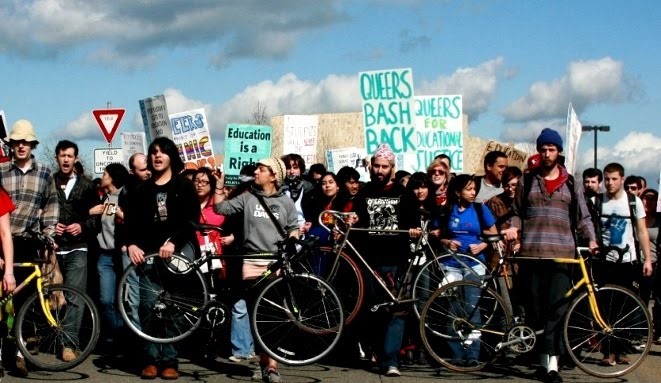
From occupations to protests, labor struggles to animal liberation actions, UC Davis has long been the site of radical actions that seek to transform the university and the world beyond. This timeline presents a non-exhaustive list of radical moments in UC Davis history. Let’s add to it together.
April 15, 1987: ALF Arson
What may be the first use of arson for the purpose of animal liberation in the United States occurs at the John E. Thurman Veterinary Diagnostic Laboratory, an animal research lab at UC Davis. In one of the earliest Animal Liberation Front actions in the US, ALF activists set fire to the lab and nearby vehicles, causing $5.1 million dollars in damage. No one has ever been indicted.
April 20, 1997: Primate Research Center Occupation
Animal rights protesters vandalize and occupy the California Regional Primate Research Center, holding the building for over four hours. After a standoff and some police violence against the protesters, cops arrest thirty-two people. One month earlier, ALF claimed responsibility for the arson of a research facility that resulted in $1000 in damage.
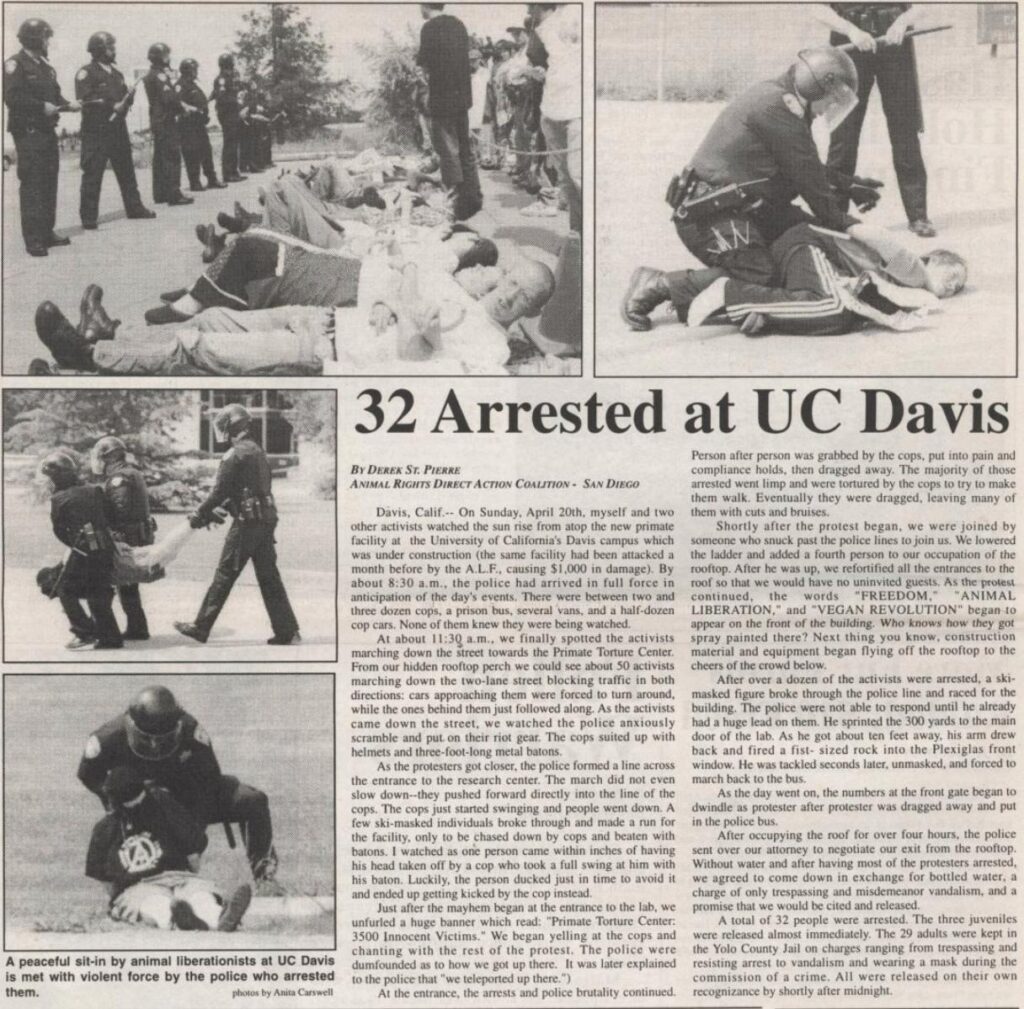
2009: September 24 Walk-Out
Organized across the UCs, the largest walkout in UC history shuts down the first day of classes at Davis and across the UC system to protest austerity programs and tuition hikes. UCD students, faculty, and staff take these actions in solidarity with worldwide university struggles, from Vienna to Athens to Puerto Rico. Multiple locations, including Mrak Hall, are occupied. Teach-ins and skillshares happen while administrators are shouted down and pushed out of every event. Campus struggle is reborn against a backdrop of increasingly desperate and violent repression by the administration. Explicit administrative uses of “free speech” and “civility” discourse attempt to stifle dissent. The campus is ungovernable all fall.
November 19, 2009: Occupation of Mrak Hall
Directly after a day of action and attempted occupation at UCB on November 18, UC Davis students return to campus and begin an occupation of Mrak Hall, the main administrative building on campus. Hundreds of students gather there over the evening, locking the doors open, ordering pizza, and refusing dialogue with the administration. Around 8pm, UCD administration calls in police, who amass in the basement in riot gear. Outside the building, the UCDPD and Davis PD officers gear up their K-9 unit, three police vans, and a police helicopter; indoors, meanwhile, occupiers chant and defy them. One undergrad leaves the building in an attempt to avoid arrest and, once outside, slips on the curb near police officers, who immediately brutalize her, throwing her onto a police car and cuffing her. Riot police inside then arrest 51 students and 1 faculty member and bring charges of assaulting an officer against the student they attacked.
January 12, 2010: Shields Library Banner Drop
A group drops large banners from Shields Library in protest of the UC’s drastic fee increase for students, worker furloughs, and threats to close one of UCD’s four campus libraries. This banner drop is followed a few months later by an unpermitted weekend-long occupation of Shields library, where students keep the building open all night; hold dance parties, workshops, know-your-rights trainings; and serve food to staff and students.
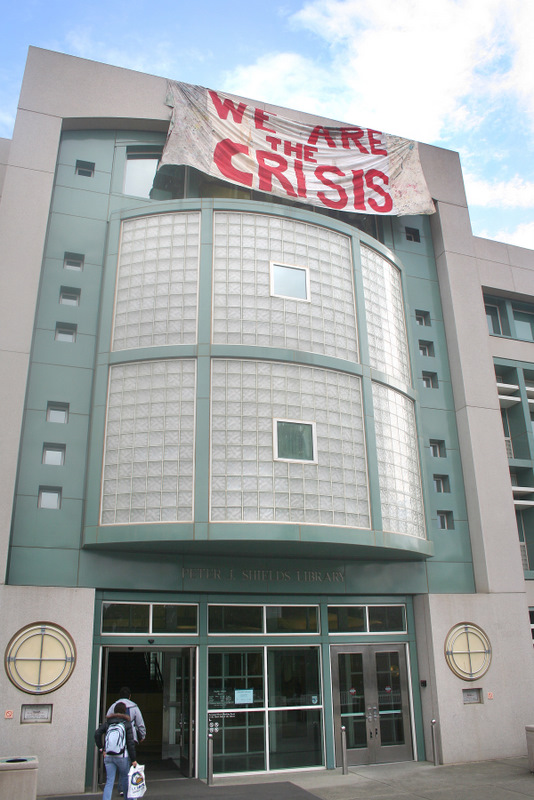
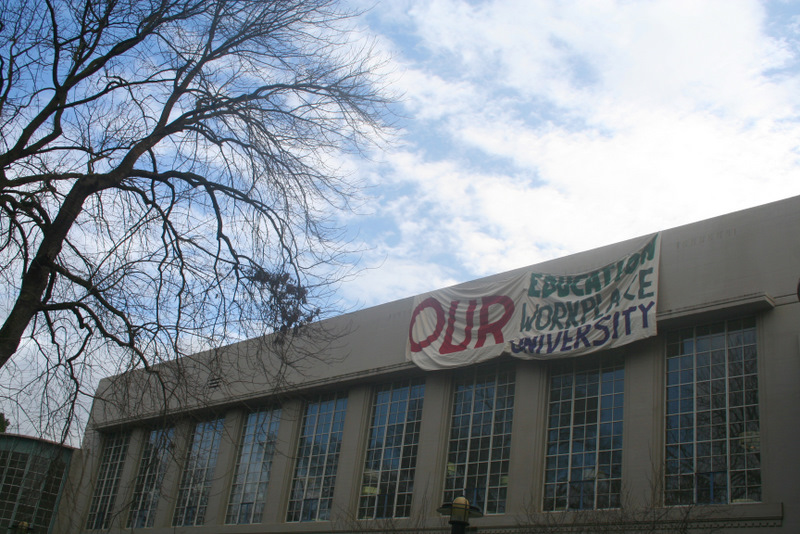
March 4, 2010: Taking the Highway
In opposition to 32% UC fee hikes and the ongoing privatization of higher education, students in Davis plan a rally for noon at the MU, then a march through campus where they pull fire alarms in the library, lecture halls, and dorms, amassing over 400 students who march through campus, shut down Russell Blvd and the Unitrans buses, then head toward the Mondavi Center and the entrance to the I-80. There they are confronted by the CHP, UCDPD, and Yolo Sheriff’s Department forces. At this point, about a quarter mile from the on-ramp, protesters ‘bloc up’ and, using their bodies and bicycles, manage to break through a line of riot police trying to prevent them from accessing the highway. In the stand-off, students are shot at and assaulted with an assortment of less-than-lethal weapons, including pepperballs (glass pellets containing an irritant powder), tasers/stun guns, and batons.
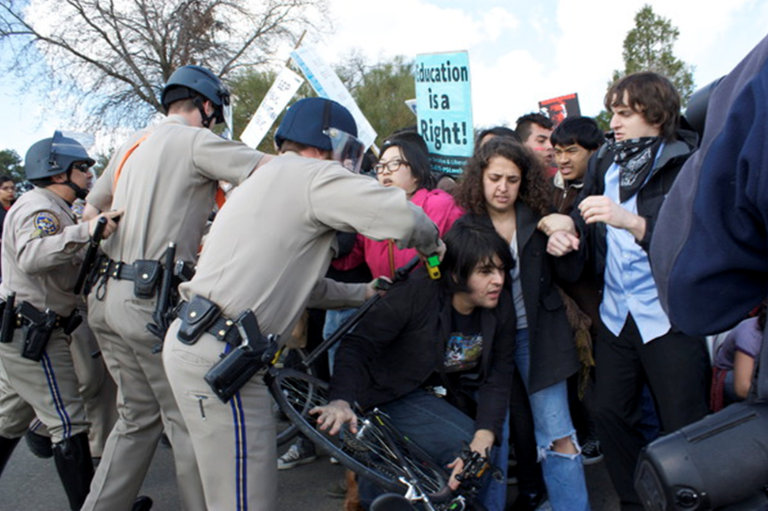
August 2010: US Bank money machines fire bombed and vandalized
Sometime in August, late at night, someone apparently throws a molotov cocktail at this campus ATM, which allegedly catches fire and smolders for hours before a morning janitorial crew member reports it. According to a campus report, the FBI is informed, but so far as we know, no charges are ever filed.
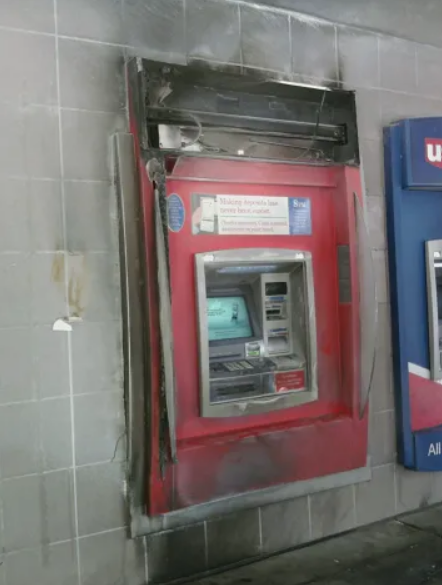
2009-2011: Occupy UC Davis
Before Occupy Wall Street begins, the student movement across the UCs, and then nationwide, is occupying campus buildings and public spaces to protest the 32% fee hikes, furloughs, and cuts to public university funding. The Davis campus sees occupations of Mrak Hall, Dutton Hall, and the Quad near the MU. Students set up tents on the Quad and spend weekends on teach-ins, workshops, and Skype calls with other occupied universities nationally and internationally.
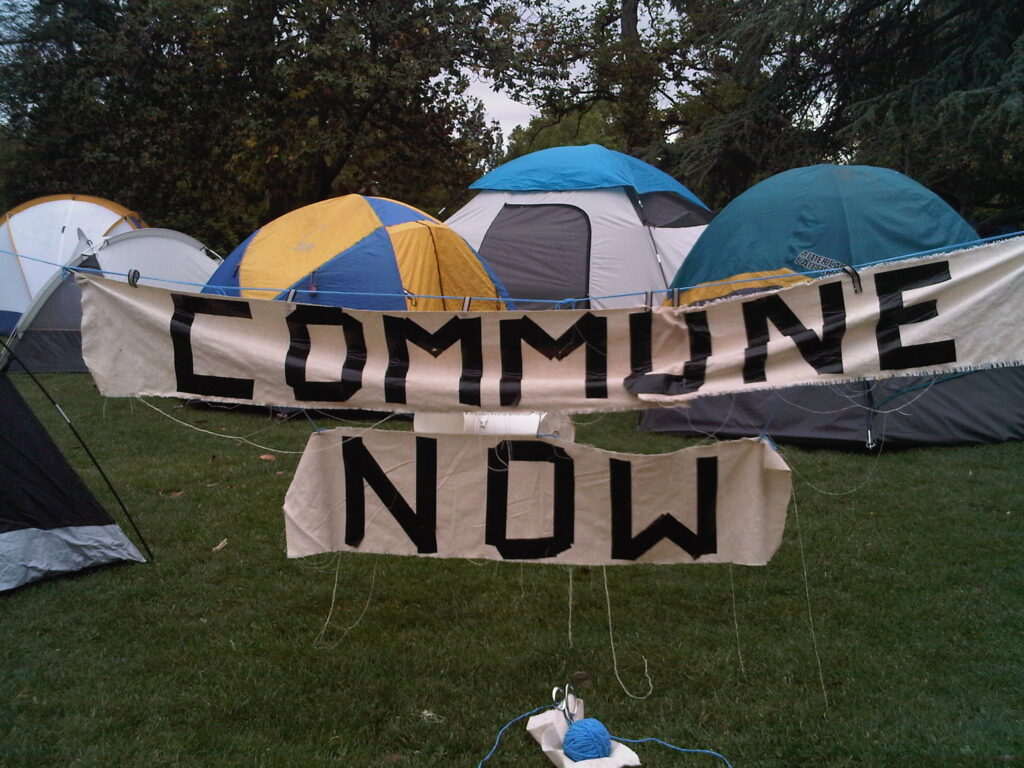
November 18, 2011: Pepper Spray (C/W police violence in text and linked video)
On Friday, November 18th, students again decide to raise tents on the quad and spend the weekend there. Chancellor Linda Katehi, allegedly concerned that out-of-town protesters—especially from Oakland—will join them, orders UCD police to remove all tents before the day’s end. At 3 pm, UCDPD gears up to clear the quad, beginning by arresting four undergrads and grad students. Met with nothing but pushback and disgust, UCDPD calls for aid and begins collecting tents, throwing them in police vehicles. The students gather in the center of the quad and hold a sit-in, refusing to leave. UCDPD, following orders from Officer Annette Spicuzza and, ultimately, Katehi, moves in on the seated students and brings out military-grade pepper spray to disperse them. Sergeant Pike sprays the protesters at close range, even reaching under some protesters’ rain jackets to spray into their faces. Students then surround the officers and shame them off of the quad. The officers will later claim in court that they feared for their lives.
November 19, 2011: Linda Katehi Walk of Shame
After the pepper spray incident makes international news, the chancellor calls a private press conference. Students find and publicize the location, meeting her and the minister whom the university had hired to walk with her. The chancellor and her entourage sneak into a building through the back to film their press release. Students surround and enter the building, getting close enough to pound on the door of the room where she is being filmed. Katehi finally leaves, followed by her lackeys. Students sit down along the only sidewalk and silently stare her down as she makes her exit. Once she leaves, people jump on the cars of her entourage.
November 21, 2011: Say It Don’t Spray It – Katehi Resign!
In response to the pepper spray incident, over 5000 students, instructors, and community members gather on the Quad for a general assembly and rally to demand the resignation of Linda Katehi. At this massive event, three votes are taken, including one on proposing to remove cops from the UC campuses. After the GA, students reoccupy the Quad and remain there until winter break.
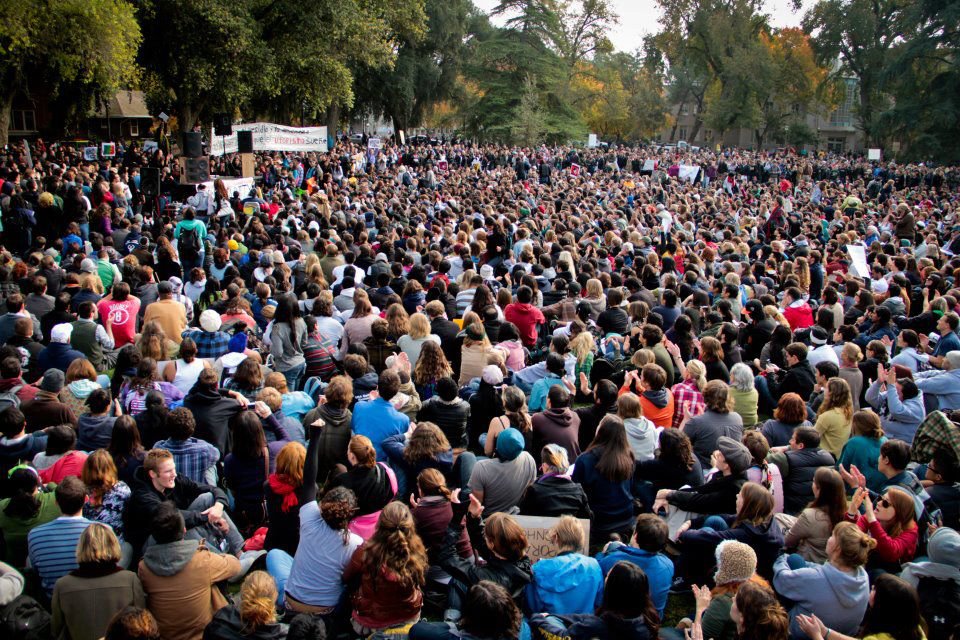
Jan 25-28, 2012: Cross Culture Center Occupation
In one of the more explicitly militant actions taken post-pepper spray, UCD students and lecturers occupy the empty building that previously housed the Cross Cultural Center and hold it as their own for three days. The occupation will be a lesson in student and worker struggle…and in administrative tactics of “soft” repression in the aftermath of their pepper-spray catastrophe. The occupiers block administrators from entering the building. As will later be discovered in court documents during the trial of the Banker’s Dozen, the university enlists other university members to subvert the occupation by pretending that the disused building, vacant for months, is still meant to support underserved students: a practice run for the now-familiar use of “diversity discourse” as an instrument of repression and demobilization — all to extend the least diverse power imaginable, the power that emanates from Mrak Hall and the police station. Meanwhile, the occupiers install a radical library and share anticapitalist and anticolonialist study groups, craft workshops, militant research, and solidarity. And also banner-making, including the large-scale paraphrase of Fanon: REVOLUTION IS THE ONLY CULTURE. Some of the occupiers describe their action in their departing communiqué, “Note from the Revolutionaries (of Color)”:
Three/four days ago when we took over the building, we began with a clear anti-colonial, anti-imperialist, and fundamentally anti-capitalist position. This was made clear when we rejected liberalism (the political supplement to capitalism): 1. We physically blocked media and surveillance into our “autonomous” space, 2. We confronted someone who wanted to sneak in an American flag into the building.
Our message was clear: We do not want administrative presence and the symbol of Empire in our space. We realize full well that the flag represents genocide, war, racism, imperialism, torture, surveillance, and the continued colonization of people (of color). We also understand the history of indigenous struggle in the Americas well enough to know that a proper anti-colonial movement (decolonization) involves the total dismantling of settler-colonialism. We also know that anti-colonialism without anti-capitalism is not a total critique of the given order. We realize that a proper struggle requires us to understand the ideological history of the Americas, the coordinates of indigenous resistance to State violence, and forms of political action that combat the ideology of colonialism. This was the foundation upon which we wanted to begin to build our movement. We knew that the rejection of the flag was symbolic, but nonetheless, we were excited about the tone the movement began to have within that space (a space that also has its own radical history).
2012: US Bank Blockade
Students and faculty members stage a seven-week sit-in at the campus branch of the US Bank to protest and impede the collusion of banks and UC Regents in profiting from student debt and other immoral and predatory loan practices. The occupation effectively closes down the campus branch of the US Bank until they break their lease and leave. In retaliation, the UC Davis administration requests that the Yolo County DA press criminal charges against the 12 bank protesters, with possible sentences of eleven years and one million dollars in penalties — each. The case goes to court, resulting in community service for the “Banker’s Dozen,” aka the Davis Dozen. This period following Occupy and the pepper spray incident sees intensified repression of student dissent, from the highly visible prosecution of the Banker’s Dozen to less public cases against students for graffiti and other low-level offenses.
March-April 2016: Chancellor’s Office Occupation
Students stage a month-long occupation of Chancellor Linda Katehi’s office on the sixth floor of Mrak Hall. Despite the administration’s threats to dismiss the students, it is Katehi who eventually leaves: suspended in April, she later resigns. Following the occupation, the administration permanently modifies Mrak Hall’s elevators and security systems to make the sixth-floor offices inaccessible without a key.
Jan 13, 2017: Shutting Down Milo
Protesters at UC Davis stop a talk by Milo Yiannopoulos and Martin Shkreli, whom the College Republicans have invited to campus. Subsequent protests at Berkeley and UCLA also result in cancellations, deplatforming Milo and shutting down the final leg of his tour.
Winter 2019: COLA Wildcat Strike Starts at UC Santa Cruz
Faced with rising housing costs and stagnant wages, graduate student workers find themselves unable to afford to live in the cities where they work. In defiance of university administrators and UAW2865 leadership alike, the Cost of Living Adjustment (COLA) wildcat strike arises in response to these untenable conditions, first at UC Santa Cruz, and then at UC campuses across the state. Santa Cruz graduate workers begin the strike by withholding grades in December 2019 and later escalate to a full work stoppage in winter 2020. During the winter, the COLA movement expands to include calls for justice for the entire university community. Most notably, the COLA4ALL coalition of undergraduates, led primarily by students of color and undocumented students, joins the strike with their own list of demands. The COLA strike lasts through spring 2020.
February 27, 2020: COLA Wildcat Strike Continues at UC Davis
After months of organizing, UC Davis grad students officially join the COLA wildcat strike, beginning a grading strike in solidarity with UC Santa Cruz. Strikers not only demand a COLA but also call on administrators to fund Ethnic Studies programs fully, disarm campus police, and divest from military and policing in compliance with the Boycott, Divestment, and Sanctions (BDS) movement for Palestinian liberation. Contrary to administrative propaganda about “harming students,” many undergraduates support the grade strike, understanding that their own struggles with fees, food insecurity, and housing costs are continuous with the struggles of the graduate students. Undergraduates also recognize that teacher working conditions are student learning conditions.
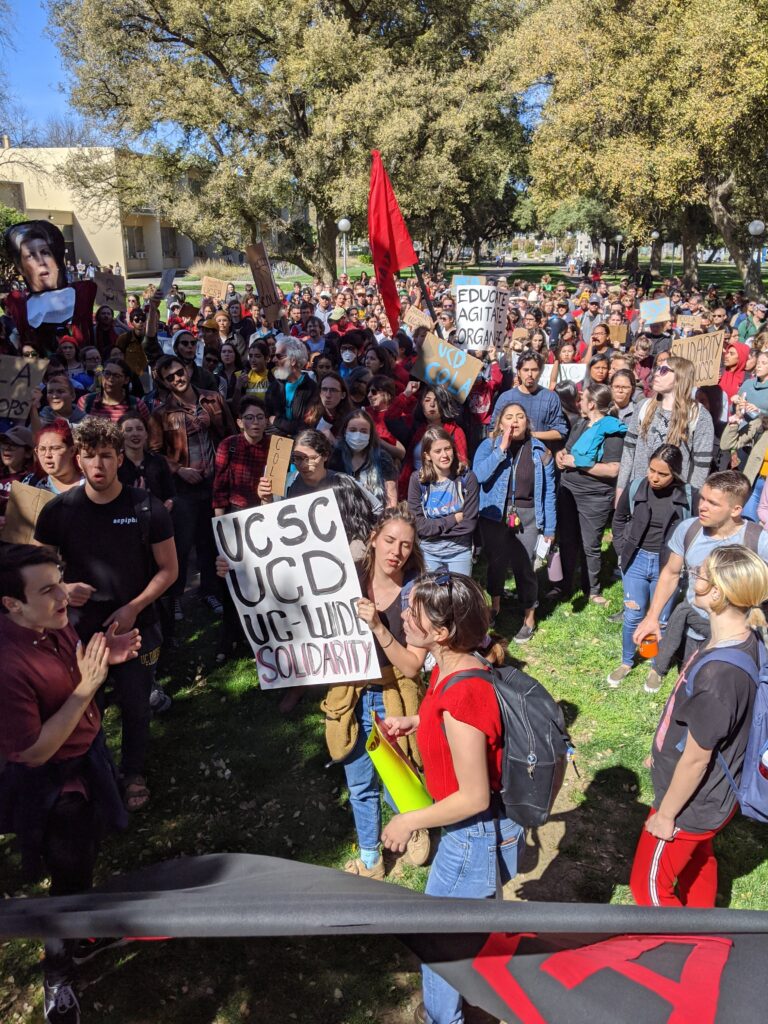
October 1, 2020: UCFTP
Following the death of George Floyd at the hands of Minneapolis police, students, faculty, and staff throughout the UC system unite to create UCFTP, a statewide network of abolitionists dedicated to getting cops off campuses and off the planet. The group begins fall quarter with a statewide day of action in which all ten UC campuses participate. At Davis, UCD Cops Off Campus stops by the police station and drops a three-story tall banner from the adjacent parking structure.
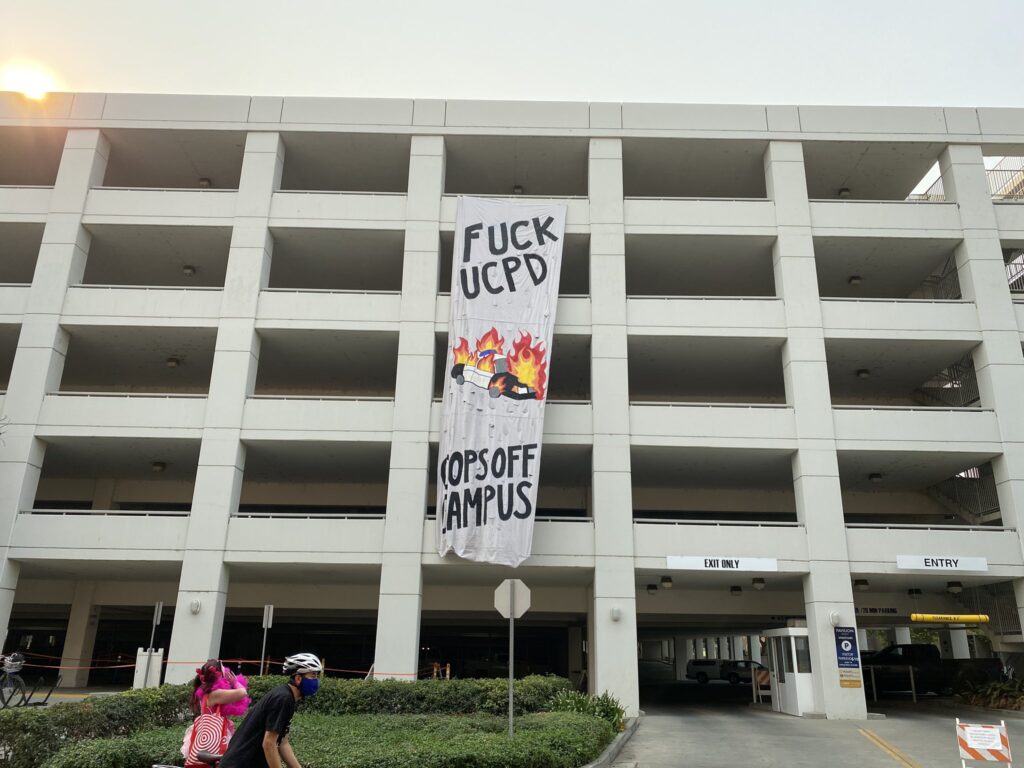
May 24, 2021: Abolition (Gary) May
As the Cops Off Campus movement grows, abolitionists from across the continent coordinate to organize Abolition May. Every day during the month of May, at least one campus hosts an action or other event in support of abolishing campus police. At Davis, campus groups and students in coalition with Cops Off Campus pay a visit to Chancellor Gary May’s house, leaving various calling cards. Student and community groups speak to the crowd about policing, mutual aid, and labor justice.
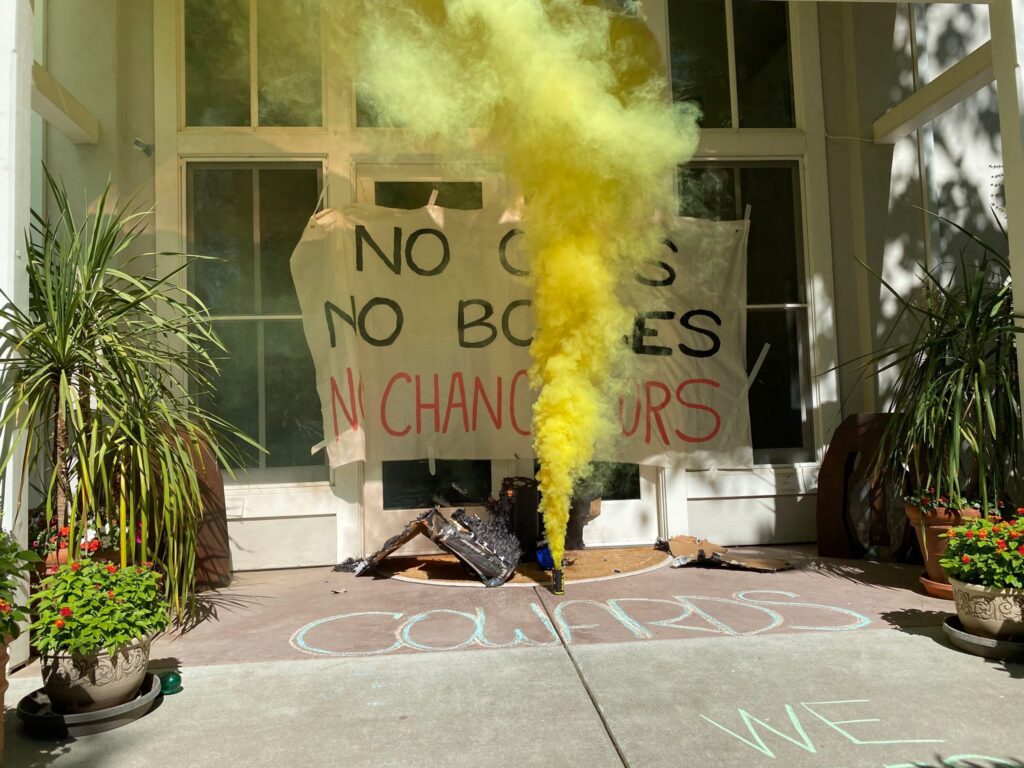
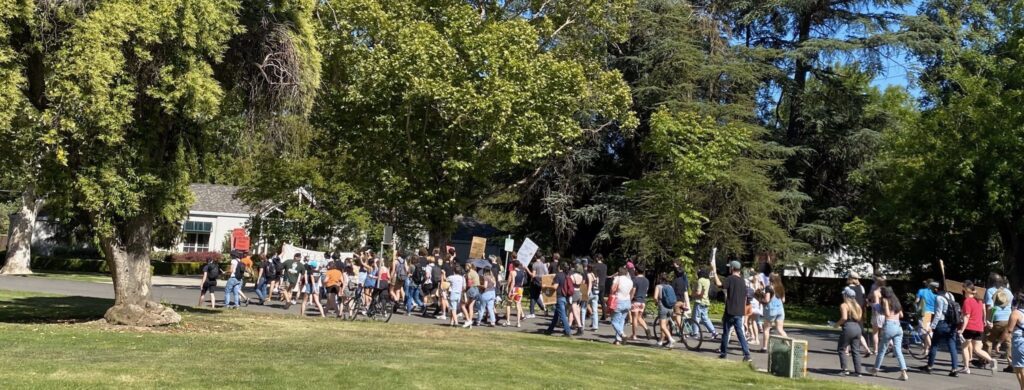
September 2021: A Banner Orientation
Cops Off Campus welcomes students back to Davis with a week of banner drops.
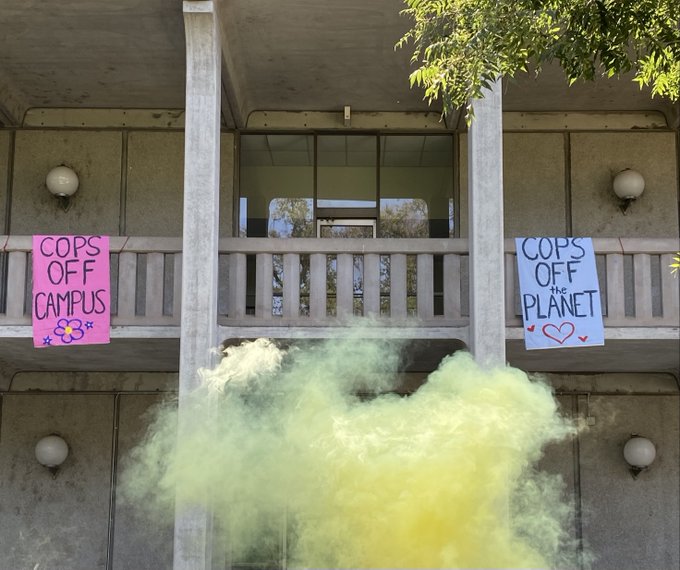
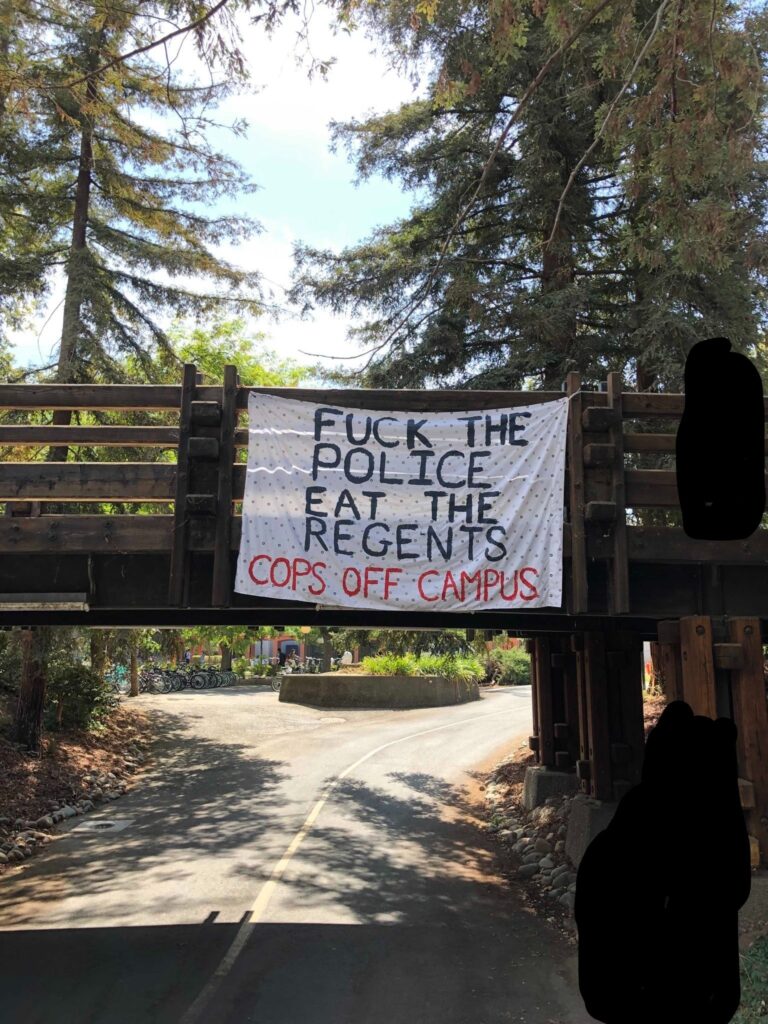
November 18, 2021: 10-year Anniversary of the Pepper Spray Incident
A coalition of student groups gather on the Quad and march to the police station to commemorate the pepper spray incident and call for the abolition of campus police. Later that evening, various locations on campus are decorated with spray paint, including the egghead sculptures.
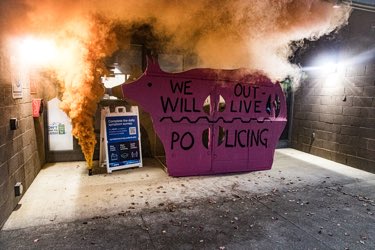
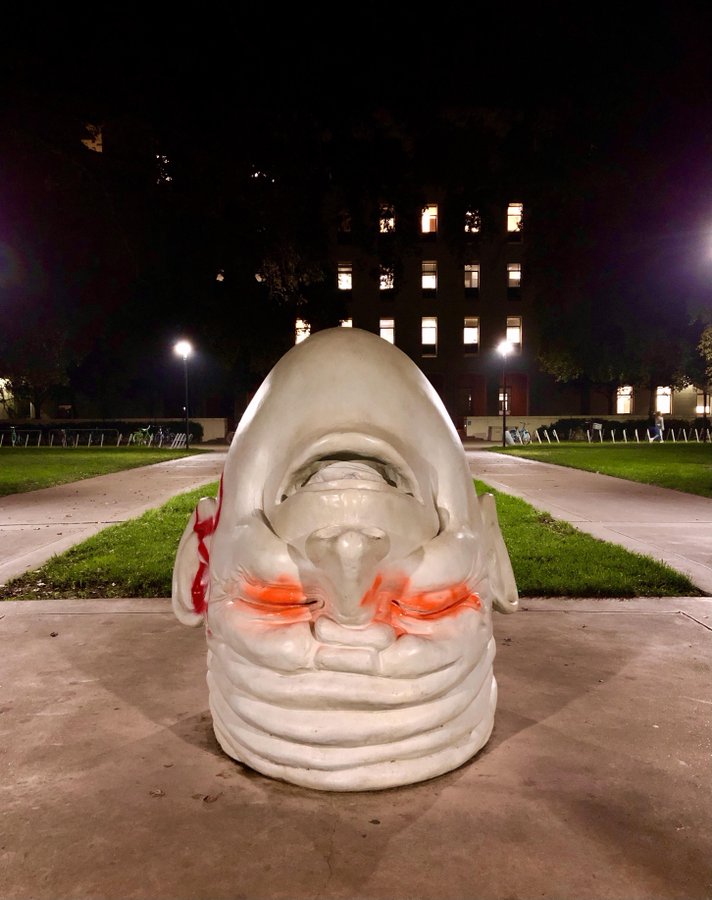
April 12, 2022: Access is Education
In response to not only the COVID pandemic but also a long history of ableist educational policies, Cops Off Campus and the Davis Free Association of Socialists lead a march to Mrak and a rally to demand accessible instruction for all. Speakers participate in person and remotely.
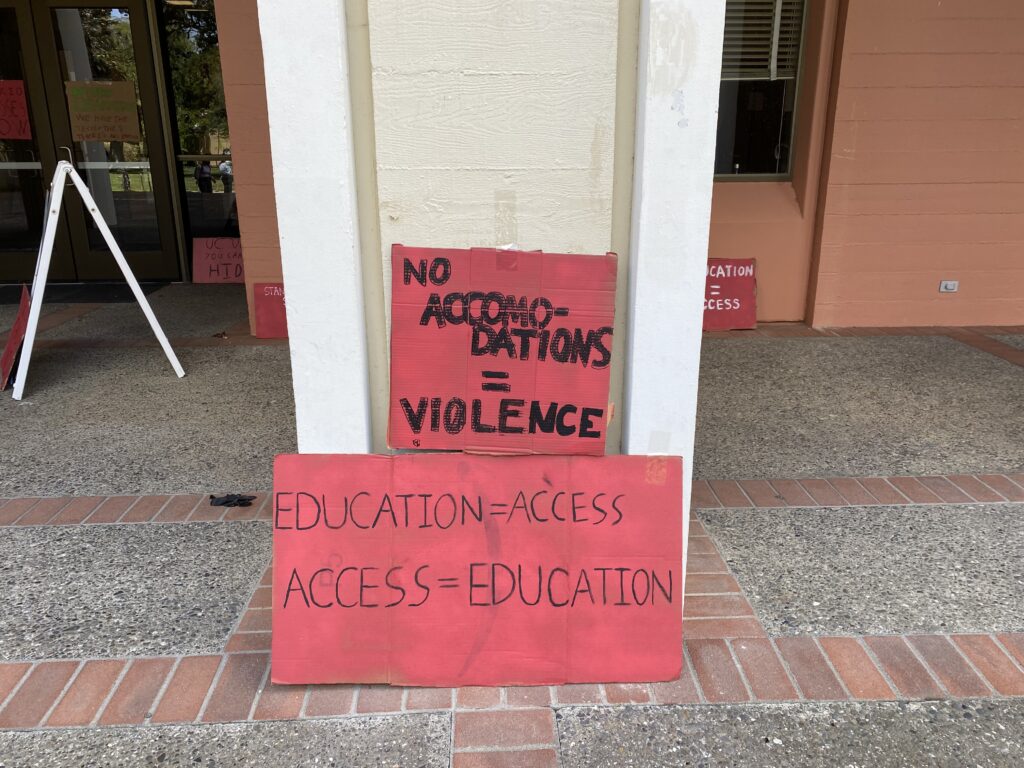
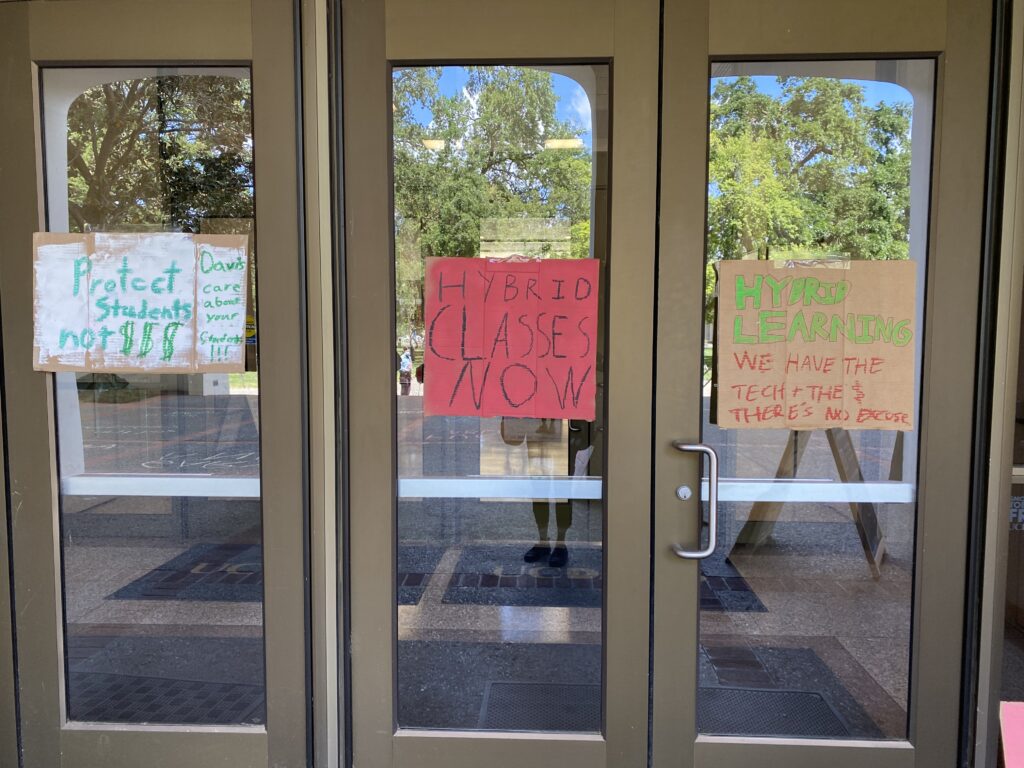
May 18, 2022: Occupation and Liberation of Latitude Dining Commons
Radical campus and community groups surround the card swipe stations at Latitude so that for two hours, everyone who enters the dining hall – students and community members – eats lunch free. A communiqué published from inside the dining hall explains the relationship between policing and food insecurity, as well as between abolition and community care. Those involved in the action describe the dining hall liberation as one small step toward the university they want to see: “Swipe-free, tuition-free, police-free, we are not joking about a free university. Administrator-free too, just as a cherry on top.”
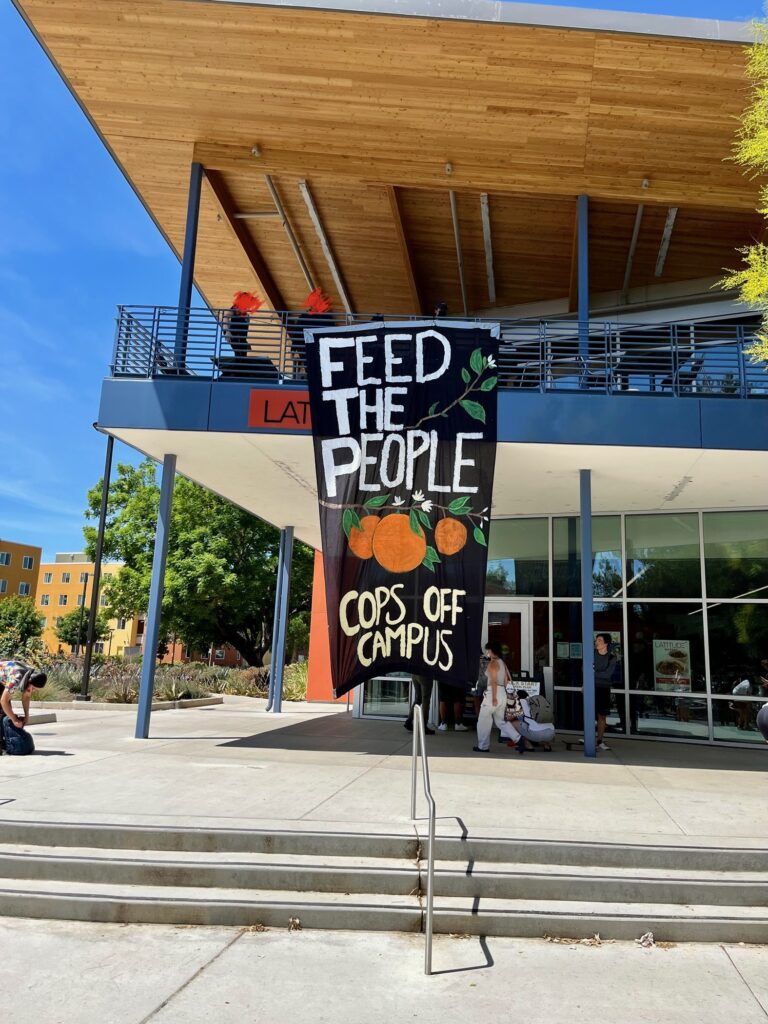
The timeline ends here, but making radical history on the UCD campus doesn’t! Watch for our actions this year, and reach out to join us, or start something of your own. We’ll see you in the streets!
Posted: September 11th, 2022 | Author: ucdcoc | Filed under: Disorientation Guide '22-'23 | Comments Off on Cops by Any Other Name
⟵ Back to Table of Contents
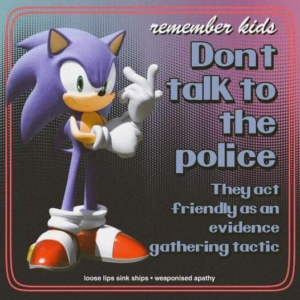
Obviously we believe that all University of California campuses need to do away with their police forces. But UCPD doesn’t just include its visible, uniformed officers going round on their ridiculous scooters and golf carts. A bunch of other offices, centers, student trainees, and staff exist belonging to so-called “teams” that do the job of policing even without a uniform. The university pays these groups and their individual members to monitor rallies, marches, strike actions, or campus speaker events that make the UC administration feel threatened. When the admin wishes they could surveil or record protests, meetings, or sponsored speaker events but fear that would look too much like a first amendment violation, they activate these teams and their members to show up and insist that they’re there to help keep students and community safe. This is, of course, a trick. They’re there to do the work of policing; they report either directly (check out the big cell phones reserved for communication with the admin that they’re usually struggling to use as they march behind you or observe from across the street) or indirectly to the UCPD; and they’re absolutely on the clock. Ask us how we know! Anyway, none of these groups are tagging along out of any genuine concern, and they’d never show up if they weren’t either getting paid or compensated through work-study: they’re administrative snitches, and you need to look out for them too.
This is a (non-exhaustive) list of groups either currently active on the UC Davis campus, or who have been identified in the recent past by student-faculty-worker coalitions whom they’ve followed or attempted to infiltrate covertly. They often do this through university procedures that require students — particularly minority and historically underrepresented students — to interact with them in their staff or director positions. This is particularly egregious — these administrators are not just snitches but gross af. We think you’ll see the pattern here, and we trust that this list will help you spot them and recognize their tactics.
Aggie Hosts
If you’ve been to a campus event you’ve certainly seen them: Davis students in black uniforms with gold stars embroidered on the chest and carrying portable radios. These students are part of the Aggie Host Security Officer Program (AHS), and their job is to “support the mission of the UC Davis Police Department.”
Aggie hosts show up to events to do crowd control and “diffuse [sic] disruptive behavior” — aka to police student protests. They also patrol the West Village and other university property, always ready to call the police on student parties, graffiti artists, and our unhoused neighbors. No matter what their purported mission, Aggie Hosts “work directly with police officers” to surveil and criminalize students, faculty, staff, and community members. No wonder UCDPD calls Aggie Hosts “critical members of the UC Davis Police Department.” No wonder so many of them end up becoming real cops when they graduate.
Aggie Host Security is sometimes presented as an alternative to policing, but we know the truth. If you work with the cops, if you report back to them, if you do their job for them, use police equipment and wear a uniform that says UC Davis Police on it, you are not an alternative to the police; you are the police.
If you see these people on campus, you should treat them like you would treat any other cop, even when they aren’t wearing their uniform. Don’t talk to them. Don’t fuck with them. Shun them in your dorms, classrooms, and dining halls. And definitely don’t invite them to parties.
CORE Officer Program
Jumping on a national bandwagon, UC Davis has devised its own contribution to “community policing,” a concept critiqued for its strategic continuation of support for the police and its historic connection to racist and classist enforcement practices like “broken windows” policing. These employees bill themselves as a chill alternative for folks who “do not feel comfortable calling dispatch,” but they work with the police and are the police. They say they “advise on a range of law enforcement issues.” Phrasing it that way makes it sound like they might be giving you legal advice about your rights, but they are not. Why would they create this confusion through their wording, encouraging you to talk freely to them? I think we all know. Similarly, one might wonder why they emphasize that they are plainclothes. They might seem to dress this way to foster a “more inclusive” environment by appearing less aggressive to students than do uniformed cops, but in reality, their civilian duds just make it all the easier for them to surveil unnoticed.
These CORE officers dress up as a cooler, non-menacing version of the police, but we urge you to treat them just like any other cop. Do not tell them anything you wouldn’t say to a uniformed police officer.
Student Expression Coordinators and the Center for Student Involvement
Leaders of registered student organizations will probably recognize this one. Any time you plan a campus event or host a meeting, you have to go through the Center for Student Involvement. They will make sure you’re following all the campus rules, that you registered your event correctly, don’t have too many people, aren’t being disruptive — they might even require you to coordinate with campus police. However, if you’ve ever organized or attended something antagonistic to the university, from a union rally to a protest over police violence, a different and much more sinister part of the CSI will reveal itself.
Every protest, strike, picket line, demonstration, or event that hasn’t requested a permit from the university will be visited by the Student Expression and Campus Activities Coordinator. This person (or maybe two or three people from related offices) will take one of two routes: often, they’ll post up a short distance from your event and monitor you, ready to call for backup on their walkie-talkie if things get out of hand; other times, they’ll walk up to people attending and pretend to be there in support. They’ll claim they just want to make sure everyone is aware of university regulations and that their job is to help you follow those guidelines so campus police don’t have to get involved. We wouldn’t want that to happen, now would we? You should always hear this as the threat it is: their job is to tell you to follow the rules, and if you don’t listen, they’ll call the cops on you in a heartbeat. They’ve also been known to identify people involved in protests or other actions and report them to the administration for student conduct violations, termination of employment, or legal action.
The Student Expression and Campus Activities Coordinator, when they’re not following people around campus like a creepy stalker, is part of the regular functioning of the CSI, helping student groups with room reservations and funding requests. The university makes sure that the Student Expression team is required at major events that vulnerable and often targeted campus groups consider essential to their communities. These administrative snitches see the power and radical potential of these student organizations — groups that fight for freedom in Palestine, for LGBTQ+ rights, for an end to incarceration, and so much more — so they step in to try to neutralize that potential. They get close to these groups, allegedly out of support, but really so they can keep a closer eye on them. You may have to talk to these people if you’re part of a student org, but you should always tell them as little as possible and avoid them at every turn. They are not your friends.
The Student Expression Coordinator job used to be done by Joseph Martinez, who recently moved on to Director of the Cross Cultural Center (more on them in a bit). We aren’t sure who will replace him as the university’s primary hired creep, so keep an eye out for any random staff who show up on the fringes of your meetings and stare.
The Cross Cultural Center and other resources for marginalized students
In 2011, a Public Records Act request revealed that UC Davis had an official bureaucracy dedicated to spying on and sabotaging student movements. The Student Activism Team (later rebranded as Student Affairs Monitors) was formed in 2010 in response to student and worker uprisings over budget cuts and tuition hikes. In the years that followed, SAM worked closely with UCPD to surveil students and workers, calling in the cops or Student Judicial Affairs on anyone who got too disruptive. Even more concerning, this public records request also revealed that staff from the Cross Cultural Center, the LGBT Resource Center, the Women’s Resource and Research Center, Asian American Studies, Chicana/o Studies, and Native American Studies all actively participated in this surveillance program. These centers and programs where marginalized students were supposed to be supported collaborated with the very people who repressed marginalized people when they spoke up a little too loudly.
UC Davis does not provide enough resources for marginalized students, and what resources are available result from years of student activism. Likewise, Ethnic Studies programs exist only because students and faculty fought for them, and the fight to ensure that these programs are properly funded and staffed is ongoing. The administration is aware of this history of struggle and targets these centers, departments, and programs for infiltration in an attempt to neutralize their radical potential. Places like the Cross Cultural Center, the LGBT Resource Center, and the Women’s Resource and Research Center provide vital spaces for marginalized students and are often instrumental in supporting the work of students, faculty, and staff who are working to make the university a better place. We honor that work, and it is for that reason that we believe these centers of all places should be spaces where students are free from surveillance and policing.
While the Public Records Request mentioned above was from 2011, it is likely that the infiltration of seemingly benign offices by cops and their friends has only gotten more subtle and insidious since 2011. For an example of what this might look like, we can turn to the University of Oregon’s Demonstration and Incident Management Teams. Like UC Davis’s Student Affairs Monitors and Student Expression Coordinator, Oregon’s surveillance apparatuses “compose a sprawling network of informants that cover roughly every non-academic department of the university.” Although the Demonstration Team has existed since at least 2017, in recent years it has updated its tactics to dodge public scrutiny by avoiding public records requests. They’ve succeeded by creating a varied and decentralized hierarchy of communication that involves the campus counsel (aka the university’s lawyer) and the council’s privileged communication with their clients. By embedding the campus counsel within these teams, the university can make a large portion of their activities privileged legal communications and thus unavailable for public records requests or other forms of scrutiny. It is likely that, in the years since the 2011 Public Records Request, UC Davis has modified their own surveillance activities in similar ways.
As the 2011 Public Records Request demonstrates, the harm caused by the Student Affairs Monitors and their ilk goes much deeper than surveillance and infiltration; even more concerning is the university’s insistence on creating intimate ties between the offices meant to support students and those meant to police them. The Center for Student Involvement, detailed in the section above, offers a great example of how these two opposite functions of care and policing get pushed together by the university — even the sacred is profaned. The Office of the President’s new Community Safety Plan, which proposes to combine policing, mental health services, and basic needs into one centralized structure, demonstrates a similar strategy to make policing seem like a necessary part of support. Whether students are seeking mental health treatment or turning to a campus resource center, the university is dead set on involving the police. But we know that it doesn’t have to be this way.
ACAB Means All of Them
We all know not to fuck with cops, but sadly that means more than just avoiding uniformed police officers. There is an entire structure of policing built into the very fabric of this university’s administration. The existence of this extensive network of spies, creeps, infiltrators, and other bootlickers is a helpful lesson in what police reforms do — they don’t reduce the power of the police, but instead deputize students, staff, and faculty to be part of the university’s policing apparatus. So long as cops exist, these so-called alternatives to policing will only ever multiply policing throughout every aspect of our lives; the only option is to get rid of the police altogether.
Posted: September 11th, 2022 | Author: ucdcoc | Filed under: Disorientation Guide '22-'23 | Comments Off on We Don’t Make Demands
⟵ Back to Table of Contents
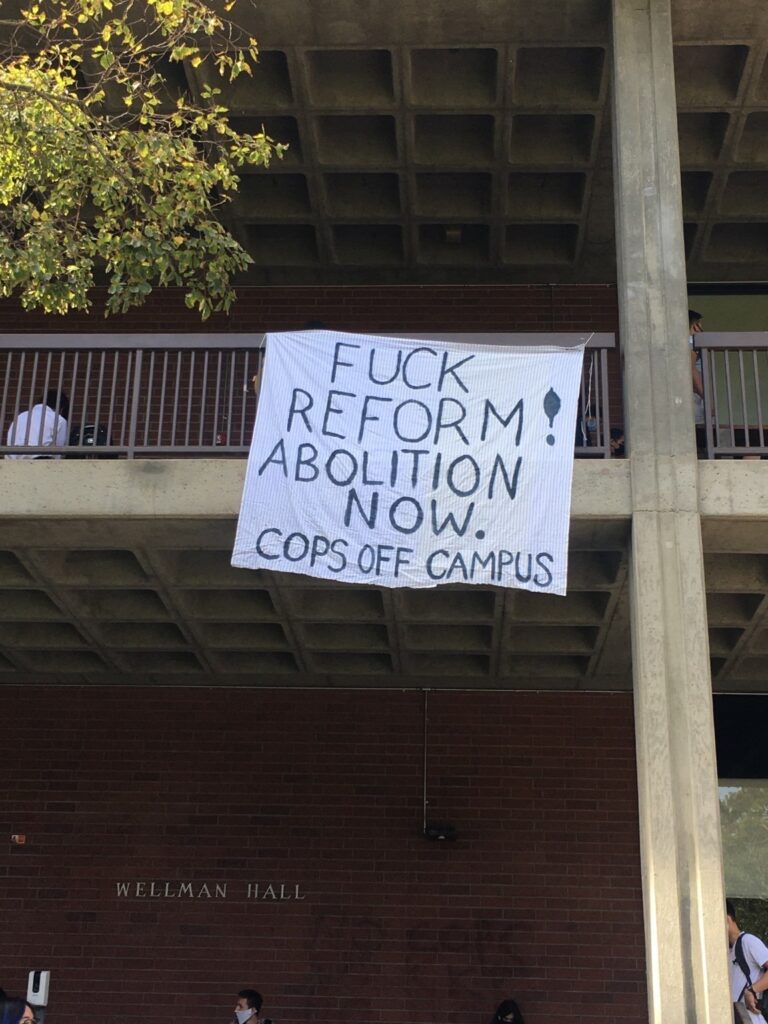
Cops Off Campus has never been shy about stating our aims. Indeed, our goal is right in our name: Cops off Campus — the immediate and total abolition of all forms of university policing. Yet we have never published a list of concrete demands. We have never explained how this should be done or provided a schematic for exactly what should come after. And this hasn’t been an accident. Our refusal to create a list of demands is a political choice.
UC Davis Cops Off Campus is committed to direct action; we are not interested in conversations with administrators who at any moment can call upon campus police to defend their positions. We’ve seen decades of discussion, listening sessions, task forces, strongly-worded statements, and promises to do better — all of these have led to nothing except the current record-levels of funding for campus cops. We know from experience that this route ends in failure, and that every day of failure is another day of violence against the most marginalized members of our community. It’s our determination to end this violence that has led us away from demands.
The logic of demands necessarily reaffirms the legitimacy of the administration
The affirmation of hierarchy is built into the act of making demands – one can only demand things from someone they believe has the power to grant them. Directing demands to a president, a chancellor, or even a department chair tacitly acknowledges their position of authority, and legitimizes it. We see no reason why administrators — who are essentially hired for their ability to fundraise — should be tasked with decisions about whether the campus community should work, live, and study with a militarized police presence. COC recognizes that the students who study and live on campus, the faculty and grad students who teach and conduct research here, and the community in which the university is set are more qualified to make decisions about what their safety means than are UC figureheads. Part of the logic of refusing to submit a list of “concerns” or “demands” to some university official is that we contest their authority, and we plan to relieve them of it.
We see their insistence that one “go through the proper channels” as both a diversion and an attempt to have us affirm their qualification to decide. And frankly, we find this insulting. We are the ones, after all, who have been brutalized, assaulted, followed, surveilled, and traumatized by the UCPD. We are the ones who track their violence and who have to insist that their focus and brutality is meted out disproportionately, overwhelmingly, on students of color, the disabled, those suffering mental health crisis, and the LGBTQIA communities.
Addressing demands to specific people or offices (the Chancellor, UCOP, etc.) would have us acquiesce to “the proper channels” — and in this case we recognize no other authority than those of the most marginalized on campus, whose safety and health is actually, verifiably, threatened by the presence of police. Moreover, the process of deciding the proper channels inevitably leads to a bunch of abstract questions about who is in charge, about what part of our overly complex and bloated administration would really be the one to “agree” to remove the cops. This is a demobilizing waste of time. COC’s refusal to address demands to various offices or administrators is therefore not only a refusal to accept the legitimacy of the administration and of university hierarchies in general, but also a practical decision about how best to direct our efforts.
Abolition is not an invitation to compromise; it’s a way to flourish
Demands that name specific mechanisms, funding structures, and time frames on the way to abolition invite reformist debates over policy. COC has a clear stance against engaging in task forces, policy discussions, and other reformist initiatives (for more info on why, you can read the statewide statement Against Task Forces). If COC were to name specific ways that we would like the administration to go about dismantling the police, we would be making policy proposals whether we intended to or not. In so doing, we would give the administration room to sidestep the problem by engaging with the details of each demand rather than with the larger issue of abolition. If we proposed moving money from one place to another over a specific time period, for example, we would inevitably be met with a chorus of quibbling and wonkery: “You don’t understand how university funding works. You can’t move money that has been earmarked for one thing to another account. This timeline isn’t realistic. We need more time to figure out how to implement this policy without causing disruption. We want to propose a different and less ambitious course of action. We are going to form a task force to study the feasibility of this proposal and will get back to you in two to three years. We are very committed to abolition.” The history of struggle at the university and elsewhere has shown that these debates are dead ends; the only way to avoid them is to avoid making demands in the first place.
Additionally, a list of demands gives administrators the space to present modest reforms as meaningful action. Presenting a concrete list of demands would give administrators leeway to meet (or partially meet, or promise to meet) one portion of our demands and then turn around and claim that they have listened and done their best. If our only “demand” is the total abolition of all policing on UC campuses, then there is no avenue for them to say that they have done what we wanted so long as the police exist.
Abolition is not Debate Team
Creating a list of reasonable demands makes it seem like we are trying to achieve our goals by convincing administrators (and others) of the soundness of our ideas. If history has taught us anything, it is that we cannot win through reasoned dialogue with the powerful. The abolition of campus police will not be achieved by convincing the administration of the feasibility of our demands, but through major disruptions to business as usual. In fact, making ourselves and our desires legible to administrators, or presenting ourselves as reasonable people with simple policy proposals, would suggest that our preferred mode of engagement is persuasion. It would reframe any direct action as a form of dialogue — a particularly flashy way to send a message — and place us in the realm of debate rather than action.
Discussion with those in power will always be a dead end, because no matter how thoughtful our arguments or how detailed our proposals, our enemies will never find us reasonable. The chancellor and administration are structurally on the side of the police. To say this is not to say that they are bad people or morally compromised in some way; it’s an analysis of their role at the university. The role of the chancellor is to ensure the smooth operation of campus by suppressing worker and student movements that threaten to undermine the university’s ability to profit (e.g. strikes for better pay) or otherwise challenge the way campus operates. This is true no matter what any individual chancellor believes — chancellors are successful at their job only to the extent that they can fulfill this role, and so are compelled to act as they do. And while chancellors have many methods at their disposal to quash worker and student movements (i.e. task forces, mediators, divide-and-conquer tactics, and communications offices full of spin doctors and propagandists), in the last instance their ability to do their job rests on the police. If every other method fails, they must be able to deploy the police to bring the campus back under their control. This means that police abolition cannot be a reasonable position to administrators — it threatens their very existence. You cannot force someone to know something that their paycheck depends on their not knowing. You can’t convince an administrator to abolish the police any more than you can convince the police to abolish themselves.
We will always seem unreasonable to those on the side of power. That is as it should be. Abolition is unreasonable within the framework that grants them that power. It is irreconcilable with the world as it exists, pointing instead to an entirely new world structured by different logics. If we ever begin to appear reasonable, it will be a sign that we have already ceded too much ground.
Cops Off Campus, Nothing Less
If we decline to make demands it is because we have chosen a different route. We are committed instead to acts of struggle, actions that we can all take together to bring us closer to a world without police. Even “Cops Off Campus” is not a demand as such. It is not a request pitched to administrators nor an invitation to compromise, but rather an articulation of our collective vision and a call to those who share our aims.
Posted: September 11th, 2022 | Author: ucdcoc | Filed under: Disorientation Guide '22-'23 | Comments Off on Resources for Causing Trouble
⟵ Back to Table of Contents
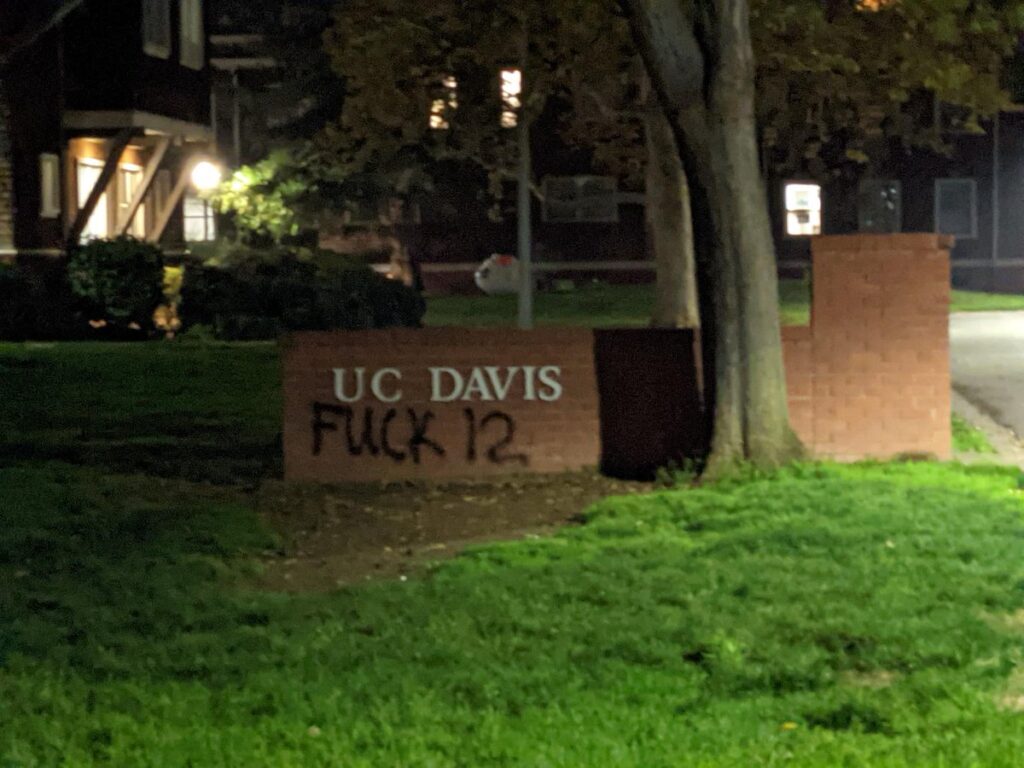
Preparation:
- Affinity Groups: You don’t need a big organization or a complicated bureaucracy to get shit done; you and a small group can get started now! Affinity groups are small crews who are down to do similar things and who choose to struggle and work together based on their shared “affinity” in ideas, visions, and goals. “Intro to Affinity Groups” will help you begin.
- Reconnaissance: Recon is an important first step for planning any action. This zine gives an introduction to reconnaissance and scouting for planning actions of whatever kind.
Fliers, Banners, and Other Form of Messaging
March, Barricade, Occupy
- For a good overall introduction to street tactics, including info on forming crews, occupying buildings, security awareness, and tips for participating in militant street protests, read “Blockade, Occupy, Strike Back.”
- Marches: If you ever find yourself wanting to organize a march, this guide can help you get started. Marches can be a great jumping off point, so don’t be afraid to get creative and combine your march with one of the other tactics listed in this section.
- Occupations: Occupying buildings is a tactic with a long history, including on UC campuses. The “Do It Yourself Occupation Guide” will give you some ideas for how to pull off an occupation, from reconnaissance to defense.
- Blockades and Barricades: “10 Steps for Setting Up a Blockade” provides a detailed introduction to blockades, while “Elements of a Barricade” provides more of a historical and theoretical reflection on the barricade as a tactic.
- Squatting: Why should people have to live on the streets when there are plenty of buildings sitting empty? “It’s Vacant, Take it” is an introduction to squatting written by a group in San Francisco.
Safety
- Security Culture: Security culture refers to a set of practices that help us keep each other safe from state repression. We recommend developing a set of security protocols with your group(s) and practicing them until they become second nature. To learn more, read “Counter-intelligence, Counter-insurgency, Security Culture & Defense” (starts on pg 39) and “What is Security Culture.”
- Protecting Your Identity: Generally speaking, it is a good idea to hide your identity at an action. For some tips on how to hide identifying features, read “Cover Your Forehead!”, “Mask Up: How and Why.” One common way to maintain anonymity is for large groups to dress in all black, a tactic known as “black bloc.” This makes it difficult for police to identify individuals within the group. For an intro to black bloc and other considerations on what to wear to actions, you can read “Blocing Up” and “Blocs, Black and Otherwise.” Another way to help people stay anonymous and therefore avoid state repression is to not take pictures of people at actions; for more thoughts on that issue, read “In Defense of Smashing Cameras.”
- First Aid at Actions: From cuts and scrapes to pepper spray to more serious injuries, it is possible that you will need to respond to a medical situation at a protest or action. This guide will give you some tips for basic first aid, while this one discusses how to deal with gunshot wounds.
Posted: September 3rd, 2022 | Author: ucdcoc | Filed under: Disorientation Guide '22-'23 | Comments Off on Smuggling Food Out of the Dining Commons
⟵ Back to Table of Contents
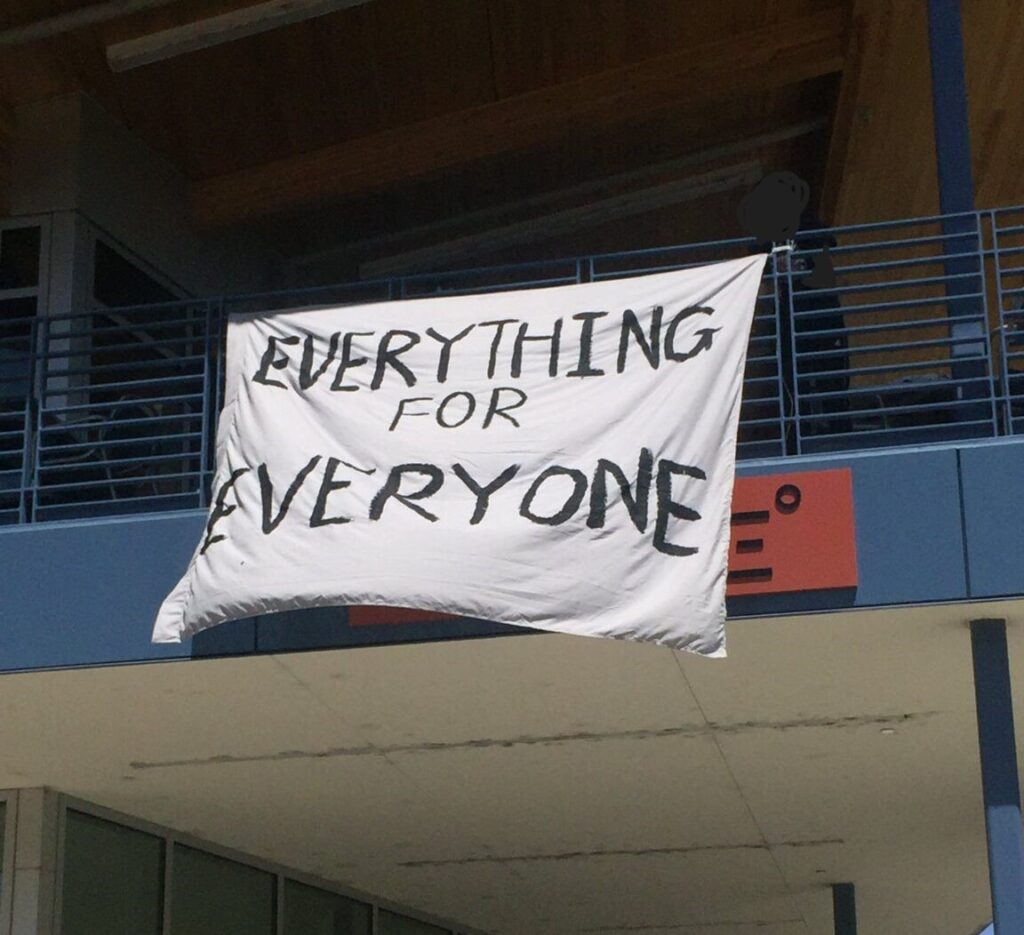
“We begin from the simplest of questions: Why, with our astounding capacity for abundance, are people hungry? Why, here atop the most arable soil on the planet, can we not supply meals for everyone? Why, at a university managed by a cadre of millionaires drawing incomprehensibly grand salaries, is there persistent food insecurity?”
“For some people these are very complicated questions. Those people are called economists. For most others, these matters are straightforward. Because we treat food as a commodity it will only be produced if it profits someone, no matter how much we need it. And because we treat food as private property, it can only be had by those who can meet its price, no matter how hungry they are. Who oversees the commodity, who keeps property private, who wields violence and threat of violence to make sure that the hungry stay hungry?”
“These are even simpler questions. As even children know, the answer is the police.”
(Excerpt from “From A Free Latitude. A Free University Begins With Free Food.”)
In 2015, a study commissioned by the University of California Office of the President found that up to 42% of students in the UC system experience “high levels of food insecurity.” While the proposed 2022-2023 budget for the UCD Police (Davis and Sac campuses) is over $14 million, ASUCD’s proposed budget for The Pantry during the same period is 2% of that amount, about $300K. And 90% of that budget comes not from the university but from community donations. No matter what the university says about its commitment to ending food insecurity on campus, these numbers tell us the truth: administrators would – many, many times over – rather pay for police to prevent students from obtaining their basic needs than pay to address those basic, and unmet, needs.
The purpose of this article is to show some ways that students with meal plans can provide food for those struggling with food insecurity. After all, only we as a community can ensure that the whole community is fed.
Smuggling Food and Dishware Out of the Dining Commons:
This guide might disappoint those looking for secret tips and cool tricks because what we’re talking about here takes minimal effort and skill. Simply, don’t pocket things in front of employees and don’t be obvious about it. If you bring tupperware, have it reasonably concealed in a jacket or bag or as you walk out of the Dining Commons. The DCs are understaffed, and the card swipe person is always too busy managing card swipes to notice you walking out with food. The writers of this article have never known someone to have gotten caught or punished for taking food out of the DC. It is easily done. You are missing out on a great opportunity to feed your friends and community if you decide not to smuggle food out of the DCs. Also remember to stay calm — the more nervous you appear, the more someone might suspect that something is off.
Remember, this is by no means a complete list. Keep your eyes and ears open to discovering new foods and methods to ensure your community is fed!
Items That Require Only Pockets and Bags – Take as many as possible for the nearest Freedge:
Fruits: This is the easiest one as the fruit stations in the DC are located in odd places where no one is paying attention to what you’re doing. Just fill your pockets with a couple fruits every meal time for you and your friends. If the DC is busy you can also just whip out your backpack and fill it up to the brim with as many apples, bananas, and oranges to later deposit in a Freedge.
Boiled eggs: In the morning the soup station has a bucket full of boiled eggs. They’re initially quite hot, so give them some time to cool or use a napkin to handle them. Otherwise, they are a good source of morning protein for your fellow students. Put them in pockets, bags, or water bottles and give them to a friend or drop them off at the Freedge. If you drop them at the Freedge just leave a little note with them that has the date they were made. Boiled eggs are good for a week before they start to spoil.
Soy/Dairy: Another source of protein, but this time it can be smuggled out at any time of day. Just go to the mini fridge near the hot water dispensers and pocket or bag the dairy and soy cartons to deposit later at the Freedge. If you are feeling confident, there are also unlocked cupboards below the milk dispensers where you can find large bags of soy and dairy that you can smuggle out of the DC in a bag or puffy jacket.
Tea bags: They’re really small. Just grab a couple handfuls of them for yourself or for a Freedge. That way, everybody can enjoy caffeinated beverages.
Dishware + Silverware: Latitude has good-looking soup bowls that can be used for anything. There’s also a bunch of them by the soup station, which conveniently has a camera blindspot. Otherwise, all the DCs have decent cups, plates, and silverware if you or anybody you know needs those kinds of things.
Items That Require Tupperware/Thermos/Water Bottles:
Panini Press: Make a bunch of sandwiches. Cut them in half before pressing (optional). Press them. Put them in tupperware. If you have a five-day meal plan then this is a great way to ensure you have food for the weekend. If you put them in the Freedge or give them to a friend, just make sure people know the ingredients inside to avoid allergy complications.
Soup Stations: They tend to be stationed away from most things so it’s really easy to fill up a large thermos with soup without anybody noticing. In the morning they also have oatmeal. Both are easily reheatable and make filling meals for later
Fresh Inspirations: It varies what can be found at this location. It’s usually a good spot to grab salad materials and massive amounts of vegetables or kidney beans. They also have cheese and sometimes crackers if you or someone else needs a snack. Just put the stuff in tupperware.
Food from any other station: Just grab a couple plates of extra of food when you are eating your meal and put the extra food in tupperware for a weekend meal if you’re on a five-day meal plan. Or give it to someone you know that it isn’t on a meal-plan or is struggling with food insecurity.
Other Food Resources:
Community Freedges At the MU and at the Silo
Food Not Bombs Serving 1-2pm on the 2nd and 4th Sundays at Central Park (4th & C)
Davis Night Market Monday through Friday 9:00 – 11:00 pm @ Central Park
The Pantry Schedule an appointment on their website; requires a Student ID
Posted: September 2nd, 2022 | Author: ucdcoc | Filed under: Disorientation Guide '22-'23 | Comments Off on All Chancellors Are Bastards
⟵ Back to Table of Contents
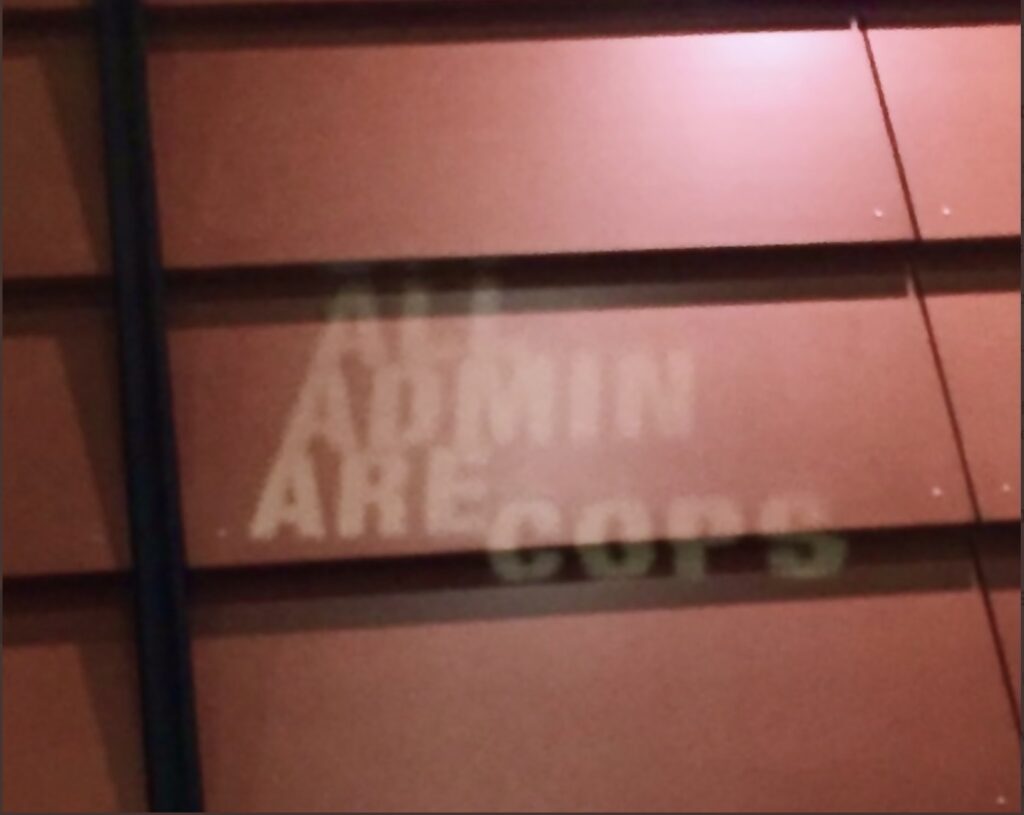
The crises that our university faces do not result from a simple case of mismanagement. There isn’t some “better candidate” for chancellor who would do the job more effectively or ethically. When things go poorly, the administration may apologize (in a legally-nonbinding manner, of course). They may in fact promise to do better and listen more. When one admin succeeds another, the newcomer will proclaim in doublespeak a debt of gratitude to their predecessor, a deep affinity with them, while also expressing the need for a sea change, a fundamental difference they claim to represent. But they are never your allies, and they don’t want to change the status quo. Administrators are administrators, that is, technocrats & functionaries, no matter how well-meaning any one of them may be. Chancellors, presidents, and regents have these positions because they are prepared to do what these positions require of them. This includes leveraging the language of diversity and inclusion while enacting policies that make education less accessible and less affordable, that make the university a worse place to work, and that prevent us from taking any actions with the potential to create real change. It is the role itself that needs to be abolished.
From Gary May calling Covid-19 “a four day head cold” to Janet Napolitano’s expansion of border policing during her tenure with the Department of Homeland Security, UC administrators have defended “business as usual” by compromising the safety and well-being of many in and outside the university. They excel at their duties: to facilitate the profit-making capacity of the UC and to suppress resistance and dissent. Let’s take a look:
Gary May: UCD Chancellor (2017- present)
The current UCD chancellor, Gary May, took office in 2017. Since 2015, he has been on the board of Leidos, a defense contractor profiting from the inhumane border control regime. He receives a salary of nearly $300,000 from Leidos, on top of his roughly $2 million in stock. (This is of course in addition to his UC salary of roughly half a million dollars.)
Back on campus, May has pushed policies that disregard the needs of disabled and immunocompromised students. From removing mandatory mask and testing requirements when COVID-19 rates were equivalent to the Omicron peak to comparing COVID-19 to a mild flu, the university has repeatedly placed profit over student lives, with May presiding over these ableist policies.
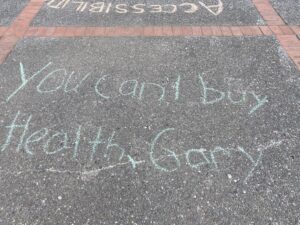
In Sacramento, May’s pet project, Aggie Square, has been faced with lawsuits claiming that developers violated the California Environmental Quality Act by failing to mitigate air pollution and housing displacement. AFSCME 3299, a UC employer union, is one of the organizations suing the university. Located in Oak Park, a historically redlined neighborhood, Aggie Square will increase local housing prices, generate traffic, and worsen air pollution, displacing residents of color in favor of “development.”
Michael Drake: UC President (2020-present)
Before he became President of the UC system, Michael Drake was chancellor of UC Irvine. In 2010, during Drake’s tenure as Chancellor, UC Irvine invited Israeli ambassador Michael Oren to campus to give a talk. A group of students, many of them members of the Muslim Student Union, briefly disrupted the Israeli ambassador’s speech in protest of ongoing human rights violations and settler-colonial violence perpetrated by the apartheid State of Israel against Palestinians, violence UCI tacitly endorsed by inviting Oren to speak. As the MSU noted, “Propagating murder is not a responsible expression of free speech.”
But administrators like Michael Drake and the police they wield exist to ensure that some types of speech – speech by the powerful defending capitalism and the state – are freer than others. UCPD handcuffed each student who disrupted Oren, removed them from the area, and detained them until Oren could finish his speech. Later, the administration charged the students with student conduct violations for disrupting a public event on university property. After pursuing disciplinary charges against those who had disrupted the speech, Drake and the UCI administration suspended the MSU and sentenced its members to 50 hours of community service as punishment; this was later raised to 100 hours. Other student groups who had organized even more disruptive protests of speaking events in the past had not been disciplined in the same way as the MSU, a fact that suggests Drake and UCI were targeting Muslim students for their support of Palestine.
Following the university’s disciplinary actions, the Orange County DA filed criminal misdemeanor charges, presumably with university support, against the students, threatening them with prison time. While many faculty spoke out against the DA’s decision, Drake did not. Ten of the students were convicted of two misdemeanors and sentenced to three years of probation, 56 hours of additional community service, and a fine. Both the university and the state punished these students for supporting the struggle for freedom in Palestine. Drake’s disciplining of the Irvine Eleven renders him complicit in criminalizing them and demonstrates his willingness to repress students fighting against settler-colonialism and state violence. Unwilling to offer even the most minimal support to marginalized people, Drake has instead been a friend of the gun and the badge.
Janet Napolitano: UC President (2013-2020)
Janet Napolitano was President of the UC system from 2013 to 2020. Before coming to the University of California, Napolitano served as the Secretary of the Department of Homeland Security under President Obama. As Secretary of DHS, Janet set new records for deportations every year of her term. Under the guise of “public safety,” she expanded the xenophobic, carceral, and white supremacist “Secure Communities” Program, or SComm, all but guaranteeing the deportation of an estimated 1.5 million people. In concert with the Obama administration’s border militarization policies, Napolitano heavily invested in border security, more than doubling the number of ICE and CBP agents and personnel. According to DHS, the agency deployed “historic levels of manpower, resources, and technology” under her leadership. Janet’s DHS bragged of these historic levels of investment in maintaining border imperialism, measured only in the lived experience of deportation and detention. Following the 2008 crisis, Congress allocated almost $6 billion to Napolitano’s DHS as part of the Recovery Act of 2009. Under her direction, this funding financed the expansion of the border control apparatus, with significant sums directed toward the proliferation of and investment in state-of-the-art surveillance technologies, including “mobile surveillance, thermal imaging devices, ultra-light detection, backscatter units, mobile radios, cameras, and laptops for pursuit vehicles, and remote video surveillance system enhancements.”
It’s telling that directly after the period of unprecedented tuition hikes accompanied by student protests and the UC-wide occupations they inspired, the UC chose the nation’s most prominent cop, border enforcer, and surveillance czar as its next president. As UC President, Janet expanded the already bloated UC Police budget by an average of 7% per year, from $98.3 million in 2013-14 to $138.2 million in 2018-19. Over this period, police budgets were doubled or even tripled at some campuses. System-wide, the $40 million increase from the beginning to the end of Janet’s term amounted to a more than 40% expansion of policing capacity. At this same time, the UC was imposing severe austerity measures and tuition hikes, provoking continuous student and worker opposition. In effect, this swell in policing was a means to secure austere financial plans and quell a nascent uprising.
Finally, Janet demonstrated her utter antipathy toward graduate students struggling under the burdens of rising housing costs by threatening those involved in the COLA (Cost of Living Adjustment) wildcat strike with dismissal.
Mark Yudof: UC President (2008-2013)
Considered a legal expert on the subject of freedom of expression, Mark Yudof conflated the protests of groups like Students for Justice in Palestine with racist and bigoted acts (a noose hung up at UCSB, the LGBT Resource Center vandalized at UCD), as if these were at all equivalent threats to the UC’s “tolerant” atmosphere.
Yudof once made a joke about his excessive salary in an interview with the New York Times, which didn’t elicit much laughter among UC students: tuition nearly doubled over his tenure as UC President (2008-2013). He argued that fee increases were unavoidable due to the 2008 financial crisis and the state’s subsequent reduction of the UC budget. This perfectly demonstrates how administrators are beholden to their roles, in that they can only “make the best” of capitalism’s crises. They can’t critique or challenge the system they consider to be natural. To administrators, the “natural” course of action is, as ever, to shift the burden onto students and workers while blaming everything on forces outside their control.
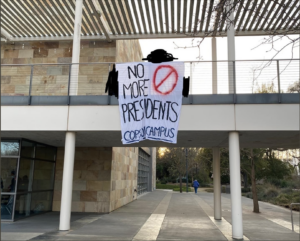
Linda Katehi: UCD Chancellor (2009-2016)
Linda Katehi was accused of numerous conflicts of interest during her time at Davis. It was found that she “failed to follow procedure” regarding travel reimbursements and use of student fees. Then there were the allegations of nepotism due to her son and daughter-in-law receiving jobs and raises at UCD. Worse still were her well-compensated appointments to the boards of institutions such as DeVry University, a shady for-profit school that has faced numerous class action lawsuits related to misleading advertising and ripping off students. DeVry has been placed under investigation for its deceptive practices. Katehi essentially used her position to enrich herself and her family in any way she could.
Her instincts to shield wealth were strong enough to have sometimes physically violent consequences. In November 2011 she directed campus police to dismantle the Occupy UC Davis tent encampment on the Quad, leading to the infamous “Pepper Spray Incident.” Afterwards, her PR statements went from defensive and accusatory toward students, to a conciliatory, apologetic tone focused on “healing the campus community” within a few days of global bad press. But her response displayed a characteristic aversion to accountability. She refused calls from that very campus community for her resignation and claimed that she had instructed the police to act “peacefully.” We were unconvinced. An investigation confirmed our suspicions, and although it unsurprisingly failed to frame the events within their political context – that of anti-privatization resistance being attacked by police forces – the Reynoso/Kroll Report nonetheless damningly indicted Katehi’s cohort. It exposed Katehi and her underlings as incompetent, petty authoritarians who ignored and suppressed information that didn’t support their intended course of action.
Katehi consistently demonstrated her priority to control damage rather than address harm meaningfully: so concerned was she about her own image in the wake of international condemnation of the Pepper Spray Incident that this Chancellor spent hundreds of thousands of the school’s money — that is to say, the money paid by students, the money that could have been used to hire teachers, the money that pays workers — hiring outside firms to conceal internet search results about the events. And her own Wikipedia page includes a glorious mise en abyme of shady conduct: “Katehi had once asked an aide to edit her Wikipedia page to protect her reputation.”
Furthering its violent protection of capitalism, the Katehi administration requested in the spring of 2012 that charges be brought against the Davis Dozen, who were accused of engaging in a sit-in protest. While we’d argue that using the legal system to punish protestors puts one on the wrong side of history by default, the charges levied in this case were excessive enough to seem vindictive.
But Katehi’s relationship to repression has deeper roots. In 2010, as Greece was facing brutal austerity measures, Katehi was part of a panel calling for the end of the country’s University Asylum law. The law had been enacted in 1982, a belated response to the Athens Polytechnic Uprising against the military junta. Katehi was a student there when the government used tanks and martial law in an attempt to suppress the movement, killing at least 24 people. After the fall of the junta, the Asylum law kept police forces off of Greek campuses for nearly 30 years. But in response to the waves of anti-austerity protests and strikes in the country, Katehi recommended abolishing the law in the name of “safety.”
Even the UC President had no choice but to recognize that an investigation “found numerous instances where Chancellor Katehi was not candid, either with me, the press, or the public, that she exercised poor judgment, and violated multiple University policies.” A month-long #firekatehi occupation was followed four months later with her ouster. Don’t worry about her well-being, though: she was blessed with a year’s pay at the level of her Chancellor’s salary just for the trouble of having to resign, and continued to receive said salary as a distinguished professor at UCD, while teaching an engineering class per quarter.
ACAB
It’s worth talking about this procession of shitty UC administrators past and present. It’s worth noting their involvement in private and government entities and asking how these interests conflict with their duty to the workers, students, and faculty they are supposed to serve. It’s worth tallying the number of times the regents have approved salary increases just as they’ve pushed fee hikes as an unavoidable necessity for maintaining the solvency of the UC system. And it’s worth remembering their more visible misdeeds – their role in the repression of activists and the stifling of dissent, in overseeing the trend toward militarized police forces becoming a fixture of university life. Let’s not forget – and let’s not let them forget, either. Let’s put them on notice: we will fight to abolish these administrative roles and make a university that is free and fair for everyone.
Posted: September 1st, 2022 | Author: ucdcoc | Filed under: Disorientation Guide '22-'23 | Comments Off on Against Task Forces
⟵ Back to Table of Contents
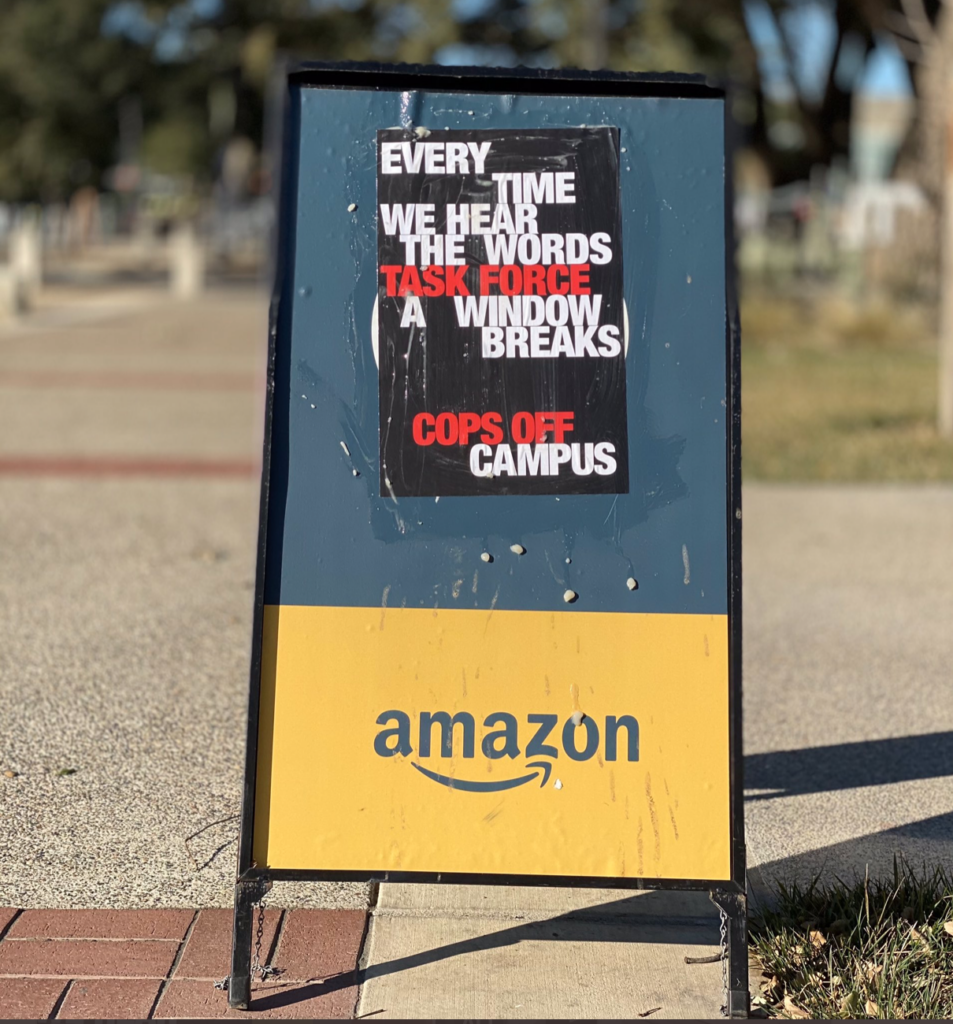
A statement by UCFTP, a statewide Cops Off Campus network in California. First published in 2020.
Aware of community-based resistance to anti-Black police violence, University of California Chancellors are convening task forces to reform UCPD into a kinder, gentler, more equal domination machine. But task forces do not make policing better. Task forces allow universities to preserve and protect the violent institution of policing. We advocate a position of refusal. Declining to serve on task forces obstructs administrative efforts to continue supporting campus police forces. Declining recognizes and exposes task forces for what they are.
We are living through the repeated failures of task forces. UC has implemented systemwide policing task forces in 2012, 2013, 2018, 2019, and that’s just this decade. The UCPD of today continues to harass, violate, intimidate, and criminalize members of the UC community, particularly its most marginalized, including Black, Brown, Indigenous, queer, trans, disabled, undocumented, proletarian students and workers. This UCPD is the outcome of task forces. Like prisons, policing (as we know it now) is not forged by reforms that preserve its fundamental structures and goals.
At a national level, we have also seen a wealth of task forces, most famously the Obama “My Brother’s Keeper” task force on policing (2014). Its marquee example was…the Minneapolis Police Force, which developed the so-called “MPD 2.0” plan that resembles in every way the current proposals. We are simply repeating that failure now. It was a massive failure long in advance of the MPD murder of George Floyd. Task forces are permission to keep killing.
Reform imagines some decent idea of policing from which we have strayed. This never existed. Task forces offer a fantasy that policing has simply deviated from some noble mission of ensuring public safety. That, however, was never its mission. Born of race and class domination, US policing first emerged in the South from slave patrols in the 1700 and 1800s that caught and returned runaway slaves; in the North, the first municipal police departments in the mid-1800s helped squash labor strikes and riots against the rich. The long history of UC police repression of campus political dissent and freedom of expression reflects what all police do everywhere. The policing that we all reject is just the police force enacting its core functions.
Task forces encourage spending more money on policing, not less. Witness the long history of investing in task forces even as dangerous and racialized policing persists. Or the pernicious idea that more equipment, more technology, more training, more cops will somehow change the basic nature of policing. There’s a lot of money in this but no accompanying evidence. Task forces are a deadly grift.
Reforms preserve the status quo. By refusing to consider national and international calls by activists and organizers to defund and abolish the police, efforts to “reform” UC police departments will preserve a status quo that continues to threaten the safety of UC students and workers, particularly Black, Latinx, and Native members of the UC community historically targeted by police.
Police, by and large, do not respond to “violent crime.” The average US metropolitan police force devotes just 4% of its time to so-called violent crime. And this represents total time, not crimes solved. The average police officer makes between one and two felony arrests per year.
Policing has no place in the university. Campus police forces are globally rare. Most educational spaces in other countries do not have them. No police, no task forces — ever. These campuses do not show evidence of greater crime, violent or otherwise. There is nothing natural, commonsensical, or safe about campus police.
Finally, incremental reform obstructs transformative justice. Race-related task forces, studies, and other reformist measures are instruments to prevent change and preserve the racial subordination that police violence enables. Task forces are not the way toward transformative justice.
-
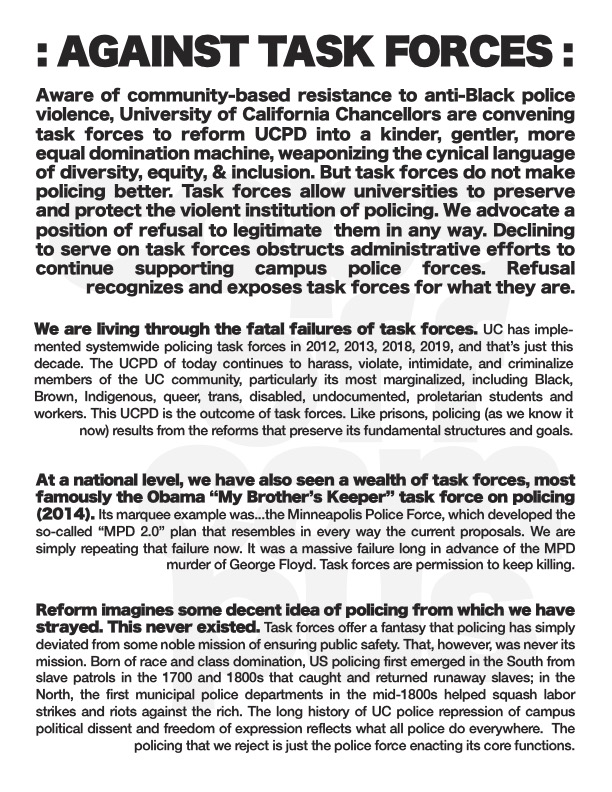
-
ATF zine, front page
-
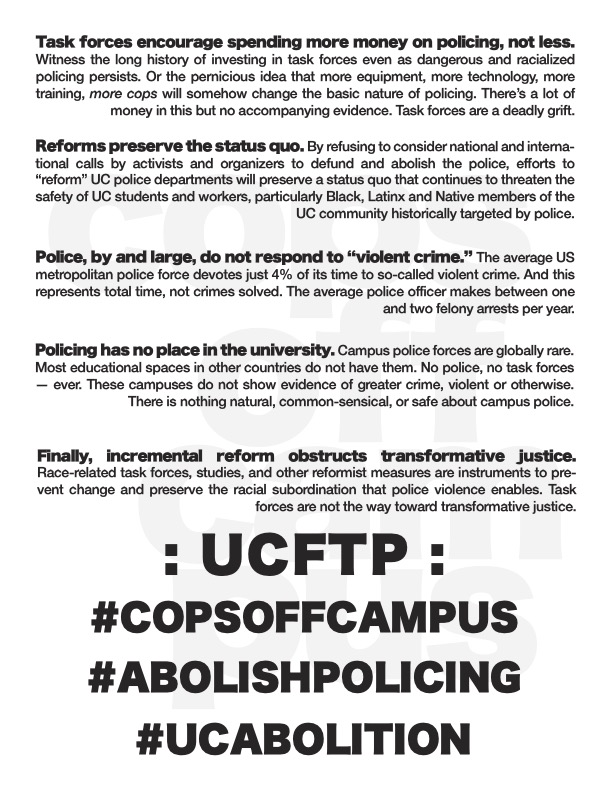
-
ATF zine, back page
Posted: August 31st, 2022 | Author: ucdcoc | Filed under: Disorientation Guide '22-'23 | Comments Off on Policing at UC Davis – A Timeline
⟵ Back to Table of Contents
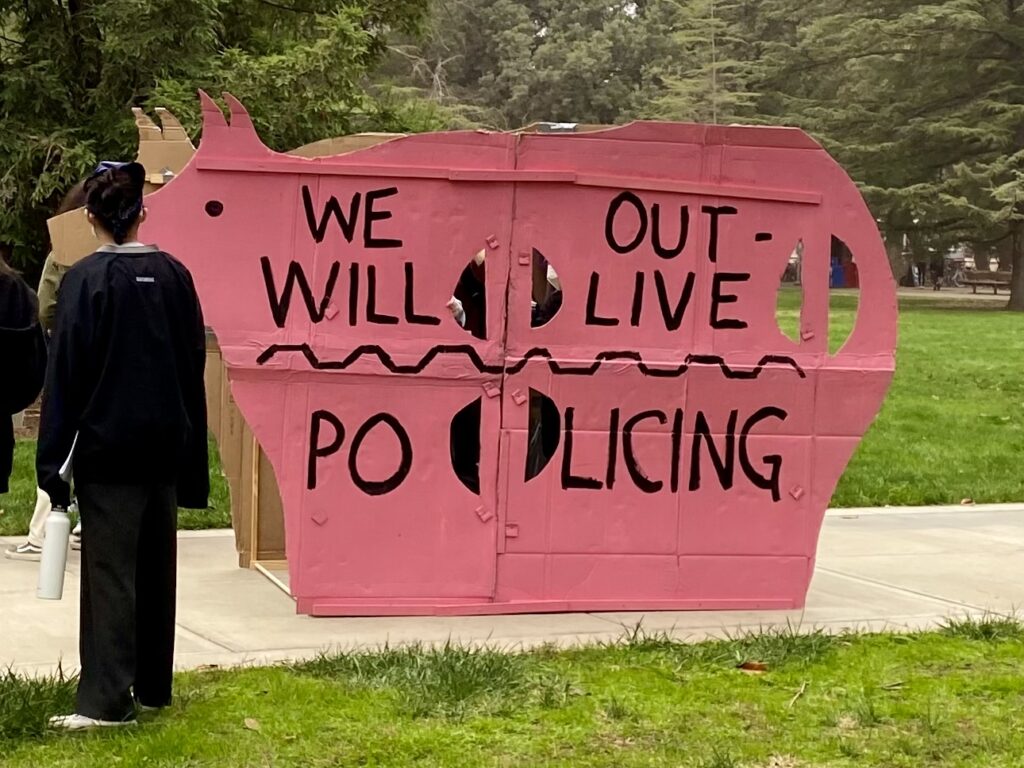
These are just a few select moments in the history of the UC Police with special attention to UC Davis; we can assure you that they have covered themselves in glory, by which we mean the blood of anyone in range of their clubs, with great regularity.
19 November 2009: Fifty-two Arrests, One Helicopter, Dogs
Confronted by a peaceful protest at Mrak Hall against massive tuition increases and other austerity measures, UCD police call in support from four other county and city forces, air support, and a canine unit. All told they make more than fifty arrests despite having no viable charges. Four officers throw one student on the hood of a police car and thus are compelled to charge her with both resisting arrest and battery against an officer. The University and the County take her to trial, earning zero convictions and one countersuit.
9 November 2011: Indiscriminate Police Violence
At a UC Berkeley Occupy protest, UCB police attack everyone they can with nightsticks, shields, and hair-pulling. County police, also present, join in the well-publicized beating of students and faculty.
18 November 2011: Pepper Spray Incident
Guilty of what one journalist calls “politicized camping,” students and others involved in Occupy Davis face police attacking their tents, seizing their possessions, and rounding them up on the quad in front of the Memorial Union. Police make random arrests. When remaining students sit down in a circle, the police apply potentially lethal amounts of military grade pepper spray to their eyes, noses, and mouths. The image becomes globally infamous and synonymous with the violence and inhumanity of police. Several of the traumatized students withdraw from school, and many endure various debilities. The university is found culpable and forced to make a large settlement. This will set in motion an extended series of events, including further massive university expenditures to sanitize its internet profile, that will eventually bring down the Chancellor who signed off on the police violence.
February 2012: The Davis Dozen
Twelve people involved in the US Bank occupation protesting student debt are charged with twenty misdemeanors and one conspiracy charge each, for the crime of sitting in the hallway of their own student union — threatening the dozen with eleven years of prison time in addition to a million dollars in restitution. The months-long court proceeding includes the document discovery indicating that US Bank no longer wishes to pursue the case and that prosecution is driven entirely by the UCD administration. It yields no convictions, a bit of community service, and one less bank.
2012: Pop Pop Pop
UC Police Fire Rubber Bullets at UC Riverside Protesters.
April 2017: The Picnic Day Five
A group of people enjoying Picnic Day are nearly hit by an unmarked police van while waiting to cross at Russell Boulevard. The cops honk and yell at them to “get the fuck off the street.” Unidentified, plainclothes cops then exit the van and begin verbally and physically assaulting the crowd. Three people of color are arrested at the scene, and two more people of color are charged afterwards although many more people are seen fighting. Only two police officers face disciplinary action (the details of which are unknown), while all five arrestees are forced to take plea deals and are placed on probation. Police records of the “Picnic Day Brawl” clearly conflict with witness testimonies. An independent audit finds that the UC Davis police report and internal investigation are “completely inaccurate” and that the cops’ conduct was “ill-advised” and “only served to antagonize.” All records are cleared as the UCDPD continues to pile up Ls.
May 2019: Modern Shackles
UCD police violently detain a community member at the campus bookstore before arresting her. The incident prompts an internal use-of-force investigation.
February 2020: Anti-Labor Action
After extensive and expensive surveillance of student labor organizers, and after campus police summon other nearby forces for support, riot cops violently attack the COLA picket line at UC Santa Cruz.
February 2020: More of the Same
UC Irvine police officer tackles a Black alumna before handcuffing her and taking her into custody during an action at Aldrich Hall. The alumna, who was on campus to get a transcript, was not participating in the event.
May 2022: Late But Useless
Regarding the scene of a fatal bicycle accident on campus, UCD police say that they “did the best they could”; an eyewitness account of police actions differs from that of the officer involved.
August 2022: Team Real Estate
UC Berkeley Police show up in riot gear to clear People’s Park, evicting unhoused people and allowing university contractors to cut down trees in preparation for construction. Community fightback pauses the destruction.
Posted: August 31st, 2022 | Author: ucdcoc | Filed under: Disorientation Guide '22-'23 | Comments Off on Wheatpasting 101
⟵ Back to Table of Contents
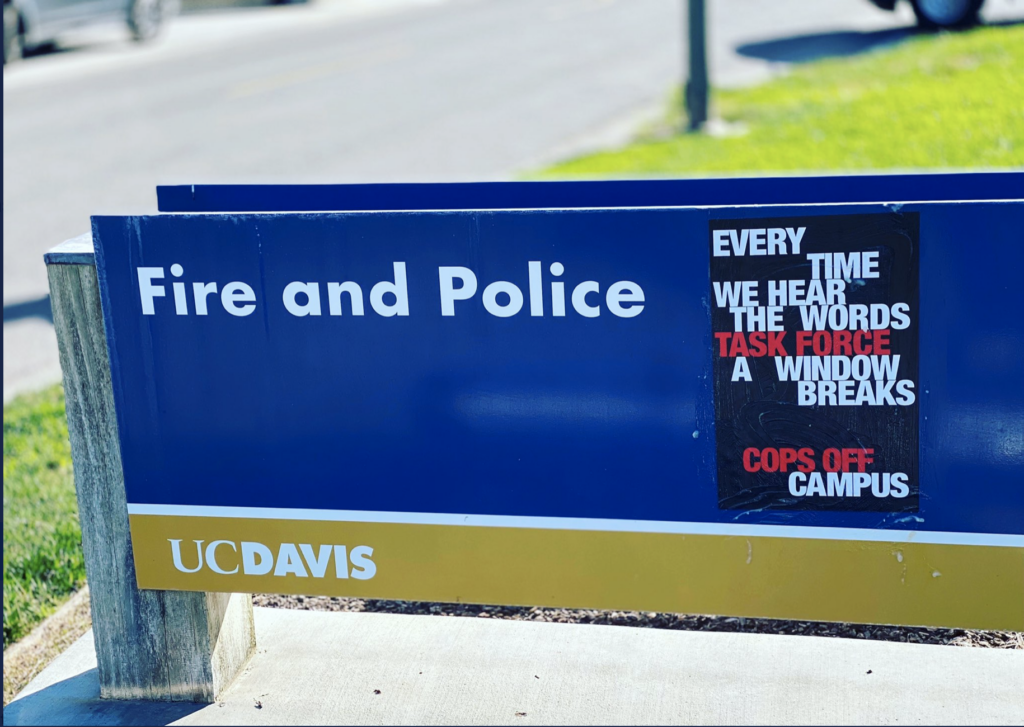
How To Put Up Fliers Pretty Much Anywhere: Wheatpasting 101
Wheatpasting is an easy, cheap way of getting your message/ideas out there in a publicly visible way that doesn’t conform to state sanctioned modes of creative and political expression. Plus it’s pretty fun, as long as you don’t get caught. The possibilities are endless in terms of messaging, so get creative! Feel free to use alongside *other* tactics of subversion and disruption and make sure to roll with a tight crew of homies you trust.
The Recipe
- 1 cup flour
- 2 cups water
- Stove or hot plate
- Medium sized pot
- A large paintbrush, squeegee, or paint roller
- Agitprop: flyers or posters (any size, but thinner paper is preferred — make sure they are legible and eye-catching!)
- Latex gloves

Directions
- Whisk together the flour and water in the pot until smooth (no lumps).
- Heat the mixture over medium heat until it boils and thickens (keep stirring to prevent clumping).
- Add a little more water and let it cook for around half an hour, and then let it cool. It should be about the consistency of wallpaper paste.
- Make sure to keep in a sealed container and store in the fridge if you aren’t using it immediately

Making It Happen
- Best to do this under cover of night, but you could also get creative and do it daytime in hardhats and safety vests or something. Make sure to have someone on lookout.
- A large-mouthed water bottle is ideal for transporting and applying the paste.
- In terms of placement, smooth metal, glass, or stucco surfaces are ideal (it will not adhere well on wood and concrete). Remember: more paste means longer drying, so plan accordingly. A messenger bag is helpful for quick access to posters/flyers.
- For smaller posters: using the minimum amount of paste, smear some paste on the surface, apply the poster (making sure to smooth out any air bubbles), and then apply some more paste to the front to secure it to the surface. Focusing on the edges will help keep them from peeling off.
- For larger posters: unroll on ground, smearing a small amount of paste on the back; then smooth out on the wall and finish with another layer of paste on top to firmly adhere it.
This article, including text and illustrations, was written by our friends at Abolish the UC and published in their 2020 Disorientation Guide.

































